- Home
- Ann M. Martin
Ten Good and Bad Things About My Life Page 7
Ten Good and Bad Things About My Life Read online
Page 7
Edward smiled. “Nope,” he said. “No prizes, no judging. This is just for fun. You can sign up by yourself or with a friend or you can put together a group.”
Jill pouted. She likes winners and losers. Even so, I saw her heading toward JBIII and I knew what she was going to ask him, so before she could snare my best friend I grabbed his arm and said, “Let’s sing a duet in the show.” (The important word in that sentence is “duet”—as in two people.)
JBIII looked a little surprised. “I don’t think I’m a very good si—”
“Great!” I said. “We’ll work on it over the weekend.”
Jill swished up to us then, all breathy like a movie star. “Jamie!” she cried. “Let’s put together an act for the talent show.”
“Oh, he can’t,” I told her. “We’re going to sing a duet. We just decided. Maybe you could do a solo act,” I added brightly.
“Oh,” said Jill. “Well, maybe.”
* * *
JBIII and I got busy that weekend.
“We don’t have much time to rehearse,” I said to him. It was Saturday morning and JBIII and I were sitting on my bedroom floor.
“We don’t even know what we’re going to sing,” JBIII replied, edging away from Bitey and looking a little nervous. But I couldn’t tell if he was nervous about singing in front of two hundred kids or nervous about being bitten.
“Yes, we do. I mean, I do. I thought of the perfect song. It’s called ‘Friendship’—since we’re such good friends.”
It was a song I knew all too well. Lexie has decided that one day she’s going to play her violin in a Broadway orchestra, so she listens to musicals endlessly in her room and tries to play her violin along with the songs. One show she has listened to about ten bazillion times is called Anything Goes and that’s where I’d heard the friendship song.
“Now there are a lot of verses in the song,” I said.
“Long verses?” asked JBIII, looking even more nervous.
“Sort of. That’s why I think we should only sing two of them.”
JBIII let out his breath. “Okay. Good. Two verses. Write down the words so I can practice at home.”
“Write them down?” I said, and a little whine came into my voice. “Let me sing them for you first.” I stood up, grabbed the stapler from my desk, and held it to my mouth. “If you’re ever up a tree, phone to me,” I sang loudly. “If you’re ever down a well, ring my bell.” I stopped. “Hey, I just had a great idea. When I say ‘phone to me’ you should pick up a phone. And when I say ‘ring my bell’ you should ring a bell.”
“You mean I don’t have to sing?” asked JBIII hopefully.
“No, we both have to sing.”
“Then please write down the words.”
As you can see, we disagreed a little about our song, and eventually we got tired of rehearsing so we decided to practice tripping instead. “You have to make it look real,” I told JBIII. “Like this.” I walked into the family room, caught my foot on the edge of the rug, and crashed into Dad’s fax machine. JBIII laughed. Then he pretended to fall over Bitey. He landed on the couch, boinged into an armchair, and almost accidentally landed on Bitey for real.
“What are you doing?” asked Lexie from behind us. She looked horrified, like she had discovered us eating caterpillars.
“Practicing,” I told her.
“That’s what you’re going to do in the talent show?”
“No, for the show we’re going to sing ‘Friendship.’”
Lexie perked up. “From Anything Goes?”
JBIII nodded.
“Want me to help you?”
* * *
That was how Lexie appointed herself our talent coach and JBIII and I wound up rehearsing way more than we had meant to, even after Lexie politely mentioned that neither of us could carry a tune.
“Are you sure you want to go through with this?” she asked us on the following Thursday, the afternoon before the show. Camp was over for the day and Lexie had insisted that JBIII and I have one more rehearsal. Dad was our audience, sitting on the couch in the office/family room and looking at us fondly, since fathers always have to think everything their children do is wonderful even when the children can’t carry a tune.
“Yes,” I said.
And JBIII whispered to me, “Do we have to sing in front of your father?” He may have forgotten that the next day he would be singing in front of the entire camp.
“Yes,” I said again.
JBIII and I hooked arms and began to take side steps across the family room. This was what Lexie called choreography, and she said a dance routine was especially important for JBIII and me so that the audience would focus on what we were doing instead of on the sound of our voices. Also, for some reason, she had recommended that we do away with the telephone and the bell.
We began the song. “If you’re ever up a tree, phone to me!”
We mixed up two lines, and JBIII lost track of the tune and just shouted the words instead, but all in all I thought we did a pretty good job. When we finished, Lexie shook her head and put her hand over her eyes, but my father jumped to his feet and shouted, “Bravo!” and I imagined that we would get another standing ovation the next day.
* * *
It turned out that an awful lot of kids had signed up for the talent show. Edward got things going at 1:30, hoping the show would be over by 4:00, which was a very long time to sit outside on log benches, especially for the youngest kids, and quite a few of them wandered away to use the bathroom or get trail mix, and one kid went after a squirrel and never came back to his bench, so the audience kept getting smaller and smaller. JBIII and I sat together with our talent coach, Lexie Littlefield. We watched kids sing solos and duets and recite poems and tap-dance and do hip-hop and put on skits. We watched kids play flutes and guitars and clarinets.
“Hey,” JBIII whispered to Lexie, “how come you didn’t want to play your violin?”
My sister shook her head. She has a problem with performance, which I certainly hope she gets over by the time she’s playing in a Broadway orchestra.
Lena and Mary Grace presented a rap song they had written, which was pretty good until the end when they couldn’t find anything to rhyme with “Merrimac.”
Then Jill walked onto the stage. She was in the middle of doing a cheerleading routine without pom-poms when I felt someone tap my back.
I turned around.
Dad was sitting behind us. He was the only parent who had shown up. This was because parents hadn’t been invited.
I gasped and nudged Lexie. She turned around, too. “Dad!” she exclaimed. “What are you doing?”
“I wanted to see the talent show,” he said.
“How did you get here?” I asked.
Dad held his finger to his lips. “I’ll tell you later. I didn’t miss your number, did I?”
And at that very second I heard a thin little applause for Jill, and then Edward announced, “Next up are Pearl Littlefield and James Brubaker.”
I don’t think you’ll be very surprised to find out that “Friendship” didn’t go much better at camp than it had in our family room the day before. JBIII forgot the words of the first verse entirely, and the dance steps, too, so for a while he just stood on the stage and watched me, and I’m pretty sure I didn’t have the tune right because when I looked out into the audience I saw Lexie with her head in her hands. Toward the end of our number I stepped on JBIII’s foot and he said “Yow” and limped through the rest of the routine.
The applause for JBIII and me was even thinner than it had been for Jill—until I heard a familiar shout of “Bravo!” and saw that Dad had leaped up from his bench and was clapping hard, his hands held above his head. After his second “bravo” he cried, “Encore!” (which means you should do another verse), but luckily Lexie got him to sit down.
JBIII and I plopped onto the first row of benches, which were now empty since all the six- and seven-year-olds had gone off to eat trai
l mix and play games. There were five numbers left in the show, and after each one I turned around to check on Dad. He was still sitting on his bench, Lexie red-faced in front of him. He stayed during Camp Merrimac Cheering, too, and I realized that he had memorized “Cumila, cumila, cumila vista,” and when we shouted “Yee-haw!” I could hear Dad’s voice over everyone else’s.
Another thing that happened that afternoon was that all the Starlettes and all the Rock and Roll Girls kept staring at Dad and giggling.
At last the buses got fired up, and it was time to leave. That was when my father ran to Lexie and JBIII and me (he was wearing sneakers) and said he was going to drive us home.
“In what?” I asked.
“Mrs. Mott’s car.”
“You borrowed Mrs. Mott’s car?” said Lexie, just as I said, “Mrs. Mott knows how to drive?”
Mrs. Mott’s car smelled like her and was the cleanest, neatest car I’ve ever seen. Our green Subaru used to have all sorts of things strewn around in it—water bottles and towels and maps and baseball hats and empty packages of cookies and a flashlight and a plastic shovel in case we ever got stuck in a snowbank, which seemed unlikely.
In Mrs. Mott’s car were just the seats. I wanted to know if she kept gum in the glove compartment, but Dad wouldn’t let Lexie open it.
I sighed. From my spot in the back, where I sat stiffly, trying not to do anything that would get Mrs. Mott’s car dirty, I peered at Dad. He had seemed very happy when he’d surprised us at camp, but now I thought he looked tired, and a little sad.
“Dad?” I said.
He glanced at me in the rearview mirror and put a smile on his face. “Yes?”
I hesitated. “Nothing.”
9
III. My self-portrait (Pearl Littlefield at Ten) was in an art exhibit.
Going on bug hunts and making sock animals and scaring Jill might not have been as much fun as riding the range or sleeping under the stars or eating baked beans around a campfire in the desert (which, I only like the idea of baked beans), but it was better than nothing. And when I looked back through my scrapbook I saw that so far my summer hadn’t been bad, considering I was the daughter of a fired person.
I had devoted two entire pages to the day Jill lost her bathing-suit top in the lake, and there was another page about the water snake, and one about the counselors who kissed, and another about the talent show. On the talent-show page I even put in the part about Dad showing up and driving us home in Mrs. Mott’s clean car.
Also, Mom and Dad had started talking about taking a staycation in August. In case you’re wondering what a staycation is, it’s something parents tell their kids they’ll be going on when they can’t fly them out to the Wild West after all.
“I’m going to take a whole week off from writing,” said Mom at dinner one night as I sat hunched over my plate on the floor of the family room. I had started out eating at Dad’s desk and had immediately dripped tomato sauce down the paper feed of the fax machine, so had been banished to the floor with a stack of dish towels.
“We’ll stay in New York and do all sorts of fun things,” said Dad as he swiped at the paper feed with his napkin. “We’ll go to the Statue of Liberty.”
“And walk across the Brooklyn Bridge,” added my mother.
“Oh!” said Dad. “And—”
But luckily he was interrupted by the telephone, which Lexie jumped up to answer, even though she has her own phone, but I guess when you’re her age you like to answer all the phones.
She listened for a couple of moments and then she said, “Okay, sure,” and handed the phone to me.
It was Daddy Bo calling, and guess what, it turned out that there was something special coming up at The Towers—Grandparents’ Day. All the old people who lived at The Towers could invite a grandkid (or some other relative or a friend) for an afternoon of fun. And if you were older than twelve you weren’t invited, so for once there was an advantage to being younger than Lexie.
“We’ll have lunch and play games and go out for ice cream and,” Daddy Bo went on, “this is the part that I thought you’d be most interested in, Pearl—there’s going to be an art exhibit for the kids. If you submit a piece of work, it’ll be framed and displayed in the gallery at The Towers. And there’ll be an opening reception in the gallery at the end of Grandparents’ Day.”
An art show! My first real art show, with an exhibit and an opening. I imagined the blue first-prize ribbon that was certain to be awarded to my painting. I would be very modest when I saw it, just all like, “Oh, this is for me? Why, thank you. What a surprise. I never expected it.” And then I would look at the painting hanging next to mine and say, “There are so many worthwhile pieces of art here. They all deserve awards.” But I probably wouldn’t mean it. After that I would go home and pin the ribbon to my lampshade and leave it there until my mother decided it was a fire hazard, and then I would move it to my bulletin board.
I thanked Daddy Bo and told him I would love to go to Grandparents’ Day and he told me how to submit my art and then he talked to Mom and Dad and Lexie for a while and I tried to figure out whether Lexie was disappointed that she was too old for lunch and games at the old people’s home.
After dinner I got right to work on the painting for the contest. Before I had even gotten my art supplies out I knew what I was going to paint: me. I mean, a portrait of me. It would be titled Pearl Littlefield at Ten, and I would paint it in black and white and gray, like a photograph.
I worked on the picture all evening until Lexie stuck her head in my room and said, “Mom wants you to go to bed.” Her eyes traveled to the painting. “Hey, that’s really good, Pearl.”
“Thanks,” I replied, and luckily stopped talking before I added, “I’ve never won a blue ribbon before.”
* * *
I decided that I should look nice for Grandparents’ Day. If I was going to win first prize in the art contest and have my picture in the paper, I didn’t want to be photographed wearing my jeans and my I’M THE LITTLE SISTER T-shirt, even if Daddy Bo had given it to me. I knew better than to wear the Christmas dress again, though, and after pawing through all my drawers I finally chose a pink flowered shirt that I absolutely hate but that has no holes in it and a short pink skirt that used to belong to Lexie and would be fine as long as I remembered to tug it around my knees when I sat down.
At eleven o’clock on the morning of Grandparents’ Day, Dad and I walked to 14th Street and caught the subway uptown. It was enormously hot again, and sorry about this, but our subway car was not only un–air conditioned but smelled like an old egg-salad sandwich stirred up with sweat. I sat next to my father and held my nose until he turned and gave me a look that plainly said, “Please stop doing that. You’re embarrassing me.”
I didn’t want him to feel bad about not having our green Subaru anymore, so I stopped holding my nose and just breathed through my mouth for the next fifty blocks instead.
We got out at 79th Street and walked to The Towers, which even though it’s a retirement community, I sort of wish I could live there. Inside the building, besides all the apartments, are a gift shop, a beauty parlor, a barbershop, a library, a gym, a crafts room, and a coffee shop plus a dining room. You can sign up to go on field trips, too, so it’s sort of like day camp for old people.
Daddy Bo was waiting for us in the lobby and he said, “Pearl, my gem of a granddaughter!” when he saw me. “You’re looking very fetching.”
My father left then, although I think he might have wanted to stay, but since he’s over twelve he wasn’t allowed.
Daddy Bo took my hand. “This way to the dining room,” he said.
We joined a long line of grandparents and kids. Some of the older kids were pushing their grandparents in wheelchairs, and some of the grandparents were pushing little kids in strollers. Everyone was talking and laughing, and Daddy Bo looked very happy and I began to feel excited.
The dining room was decorated with a big sign that s
aid WELCOME TO GRANDPARENTS’ DAY, and there were bunches of balloons floating around the ceiling and crayons at the tables so you could color on the paper mats.
“Look at all the food,” I said.
“It’s buffet style,” said Daddy Bo. “Grab a plate and take whatever you want.”
“Really?” This was better than leftovers night, except that there wasn’t any Count Chocula.
Daddy Bo and I walked up and down a long table, and I took a little helping from almost every dish there, even though I wound up with some things I didn’t recognize. Then we sat at a table with three of Daddy Bo’s friends and their grandchildren.
“What an adventurous eater you are,” this one old lady said to me.
And at that exact moment I opened my mouth and put something shiny into it, and the shiny thing turned out to be not only very salty but also very slimy.
Daddy Bo turned to me. “I didn’t know you liked oysters, Pearl.”
I choked on the oyster, which was so slippery that when I accidentally swallowed, it went all the way down in about one half of a second. I gagged and drank a lot of water, but I don’t think anybody noticed because the old lady said to Daddy Bo, “Her name is Pearl and she likes oysters?” and everyone laughed, including me, even though my eyes were watering.
After that, I paid more attention to what was on my plate and stuck to things like banana slices and peanut butter and hot dogs.
When lunch was over everyone went into another room for games. We played games that weren’t too hard on the old people—things like Pictionary and charades—and there weren’t any prizes involved, but it was still fun.
After charades, Mrs. Means, who was the activities director at The Towers and not mean at all, said, “We have about fifteen minutes before we’ll leave for the ice-cream shop. Can anyone think of another game to play?”
I raised my hand. “I could teach everyone a chant,” I said, and before I knew it, Daddy Bo and Mrs. Means and Daddy Bo’s friends and all the kids were shouting, “Cumila, cumila, cumila vista.”

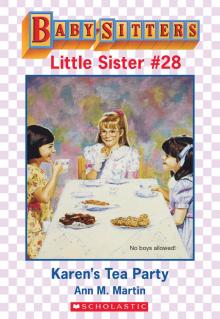 Karen's Tea Party
Karen's Tea Party Kristy and the Snobs
Kristy and the Snobs Best Kept Secret
Best Kept Secret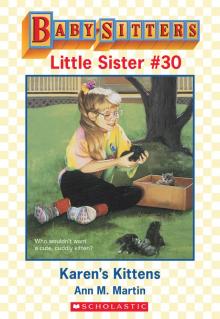 Karen's Kittens
Karen's Kittens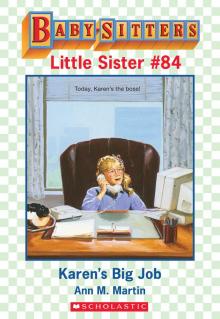 Karen's Big Job
Karen's Big Job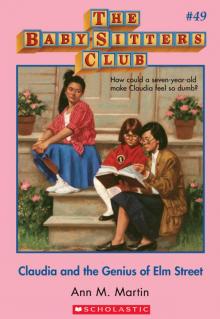 Claudia and the Genius of Elm Street
Claudia and the Genius of Elm Street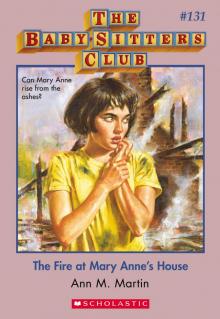 The Fire at Mary Anne's House
The Fire at Mary Anne's House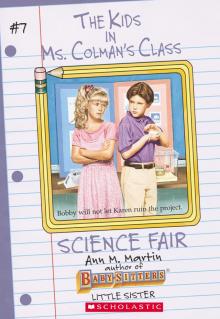 Science Fair
Science Fair Me and Katie (The Pest)
Me and Katie (The Pest)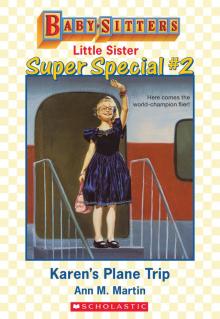 Karen's Plane Trip
Karen's Plane Trip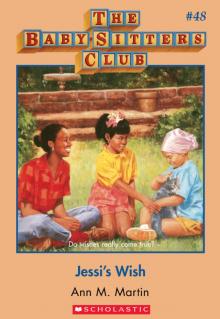 Jessi's Wish
Jessi's Wish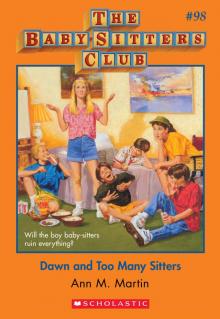 Dawn and Too Many Sitters
Dawn and Too Many Sitters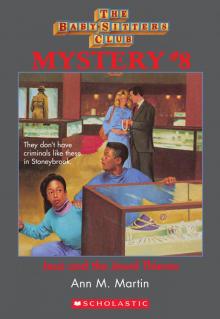 Jessi and the Jewel Thieves
Jessi and the Jewel Thieves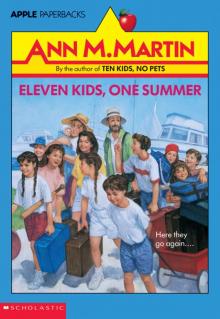 Eleven Kids, One Summer
Eleven Kids, One Summer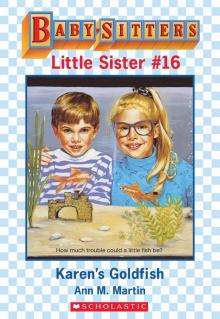 Karen's Goldfish
Karen's Goldfish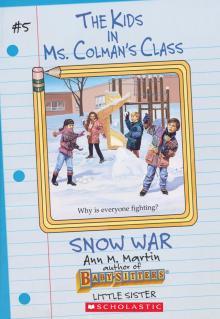 Snow War
Snow War Abby and the Secret Society
Abby and the Secret Society Keeping Secrets
Keeping Secrets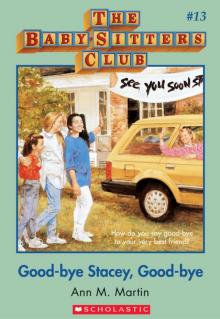 Good-Bye Stacey, Good-Bye
Good-Bye Stacey, Good-Bye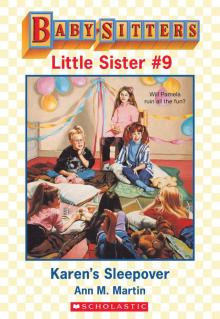 Karen's Sleepover
Karen's Sleepover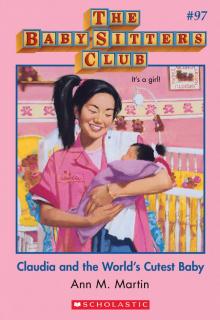 Claudia and the World's Cutest Baby
Claudia and the World's Cutest Baby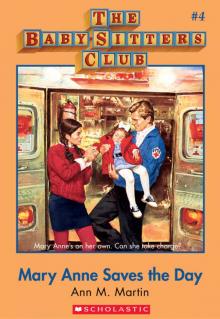 Mary Anne Saves the Day
Mary Anne Saves the Day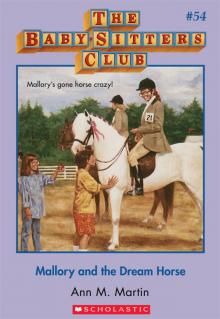 Mallory and the Dream Horse
Mallory and the Dream Horse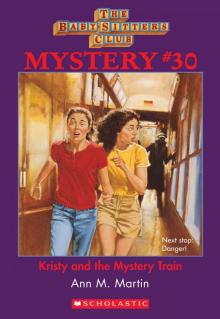 Kristy and the Mystery Train
Kristy and the Mystery Train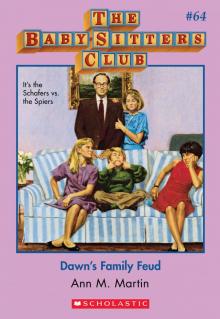 Dawn's Family Feud
Dawn's Family Feud Karen's Twin
Karen's Twin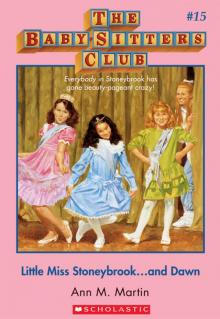 Little Miss Stoneybrook... And Dawn
Little Miss Stoneybrook... And Dawn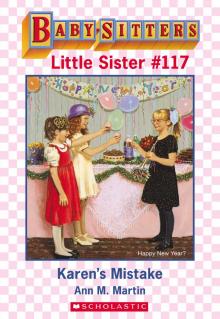 Karen's Mistake
Karen's Mistake Karen's Movie Star
Karen's Movie Star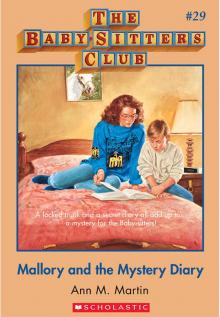 Mallory and the Mystery Diary
Mallory and the Mystery Diary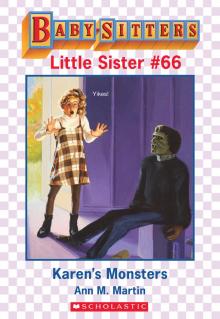 Karen's Monsters
Karen's Monsters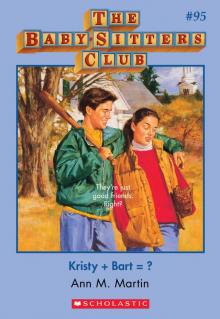 Kristy + Bart = ?
Kristy + Bart = ?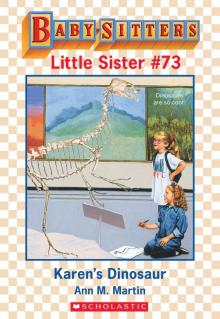 Karen's Dinosaur
Karen's Dinosaur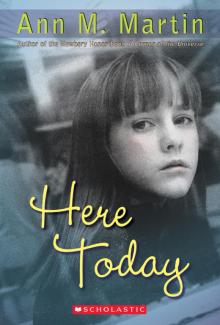 Here Today
Here Today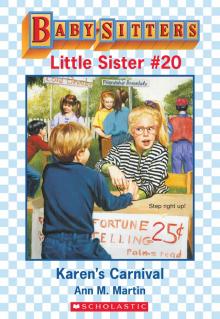 Karen's Carnival
Karen's Carnival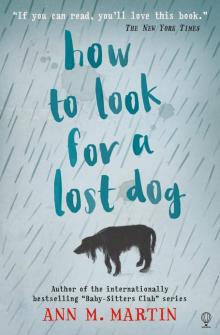 How to Look for a Lost Dog
How to Look for a Lost Dog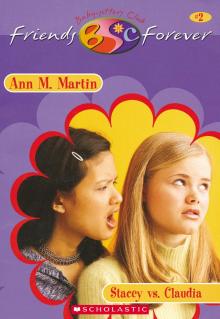 Stacey vs. Claudia
Stacey vs. Claudia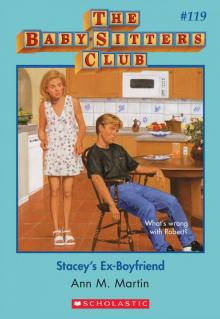 Stacey's Ex-Boyfriend
Stacey's Ex-Boyfriend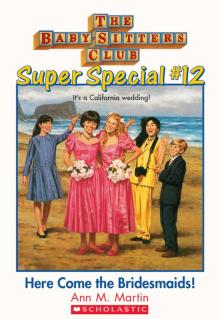 Here Come the Bridesmaids!
Here Come the Bridesmaids! Graduation Day
Graduation Day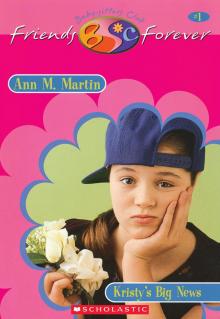 Kristy's Big News
Kristy's Big News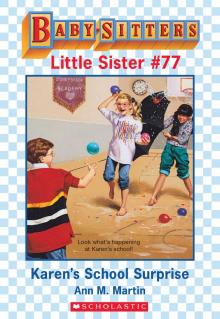 Karen's School Surprise
Karen's School Surprise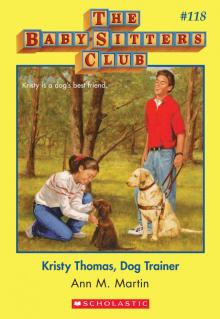 Kristy Thomas, Dog Trainer
Kristy Thomas, Dog Trainer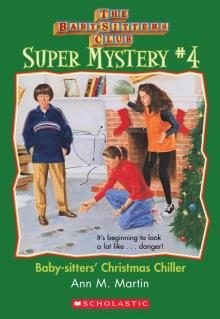 Baby-Sitters' Christmas Chiller
Baby-Sitters' Christmas Chiller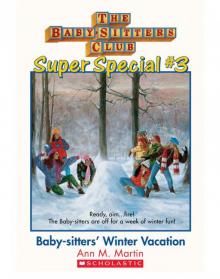 Baby-Sitters' Winter Vacation
Baby-Sitters' Winter Vacation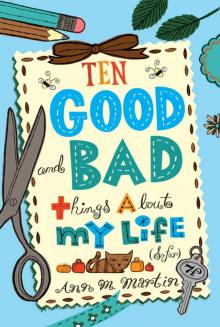 Ten Good and Bad Things About My Life
Ten Good and Bad Things About My Life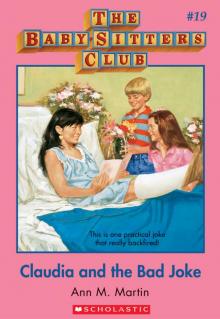 Claudia and the Bad Joke
Claudia and the Bad Joke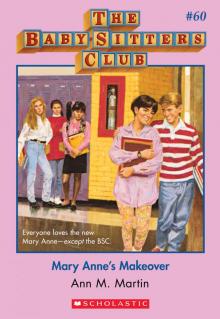 Mary Anne's Makeover
Mary Anne's Makeover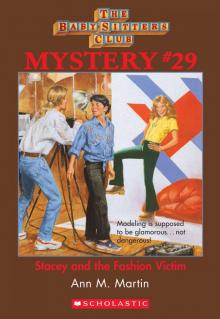 Stacey and the Fashion Victim
Stacey and the Fashion Victim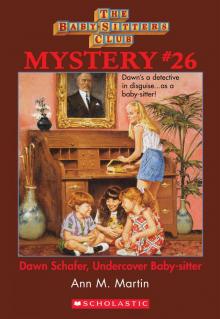 Dawn Schafer, Undercover Baby-Sitter
Dawn Schafer, Undercover Baby-Sitter Karen's Tuba
Karen's Tuba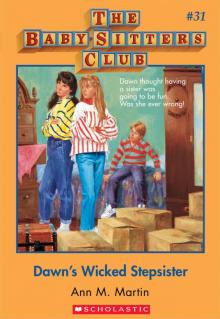 Dawn's Wicked Stepsister
Dawn's Wicked Stepsister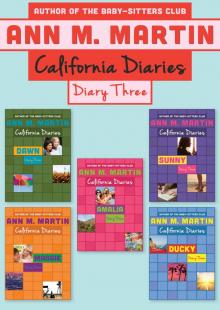 Diary Three: Dawn, Sunny, Maggie, Amalia, and Ducky
Diary Three: Dawn, Sunny, Maggie, Amalia, and Ducky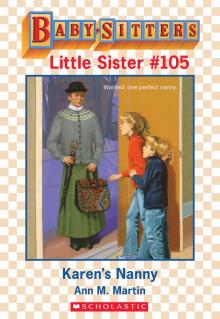 Karen's Nanny
Karen's Nanny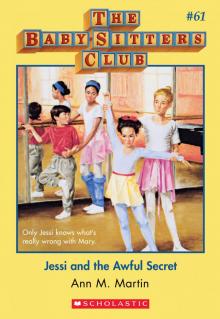 Jessi and the Awful Secret
Jessi and the Awful Secret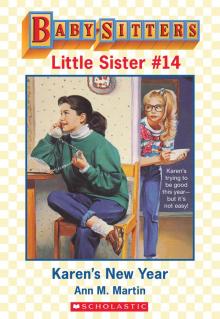 Karen's New Year
Karen's New Year Karen's Candy
Karen's Candy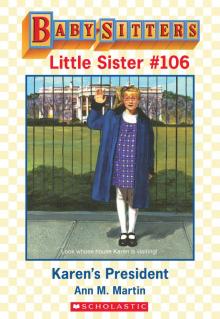 Karen's President
Karen's President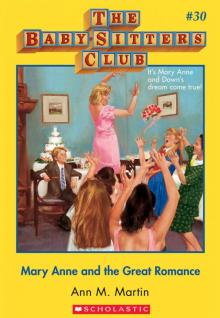 Mary Anne and the Great Romance
Mary Anne and the Great Romance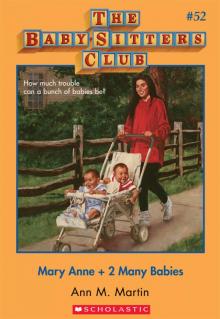 Mary Anne + 2 Many Babies
Mary Anne + 2 Many Babies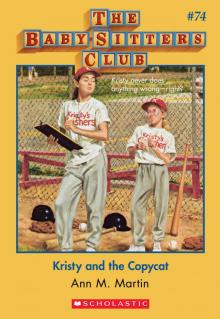 Kristy and the Copycat
Kristy and the Copycat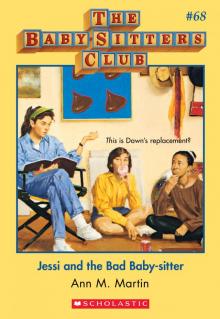 Jessi and the Bad Baby-Sitter
Jessi and the Bad Baby-Sitter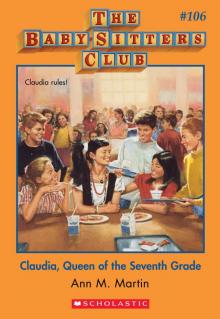 Claudia, Queen of the Seventh Grade
Claudia, Queen of the Seventh Grade Claudia and the Lighthouse Ghost
Claudia and the Lighthouse Ghost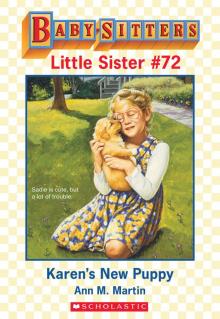 Karen's New Puppy
Karen's New Puppy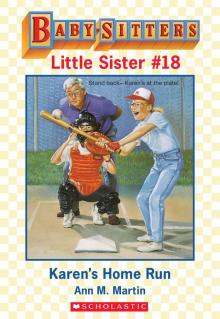 Karen's Home Run
Karen's Home Run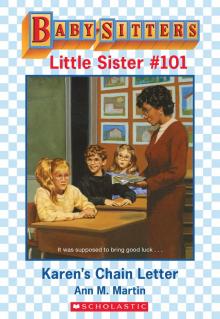 Karen's Chain Letter
Karen's Chain Letter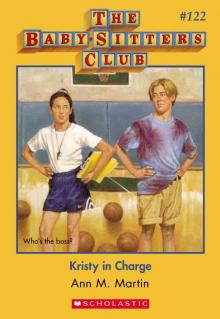 Kristy in Charge
Kristy in Charge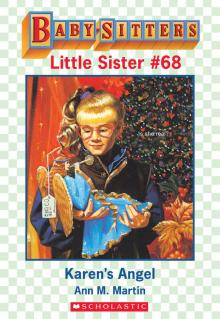 Karen's Angel
Karen's Angel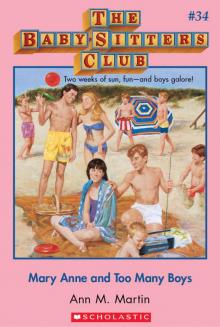 Mary Anne and Too Many Boys
Mary Anne and Too Many Boys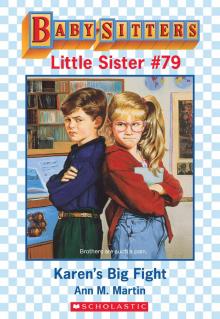 Karen's Big Fight
Karen's Big Fight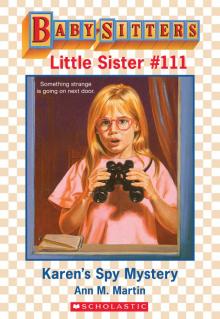 Karen's Spy Mystery
Karen's Spy Mystery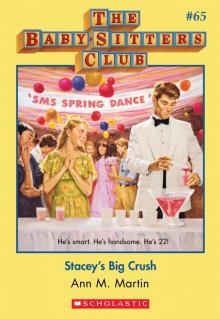 Stacey's Big Crush
Stacey's Big Crush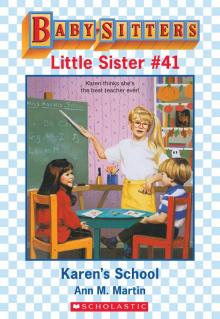 Karen's School
Karen's School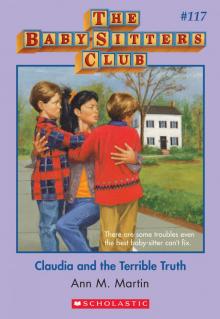 Claudia and the Terrible Truth
Claudia and the Terrible Truth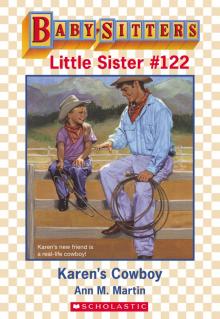 Karen's Cowboy
Karen's Cowboy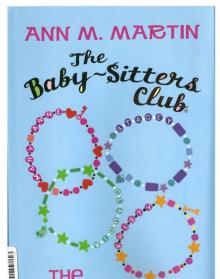 The Summer Before
The Summer Before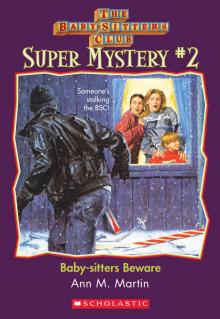 Beware, Dawn!
Beware, Dawn!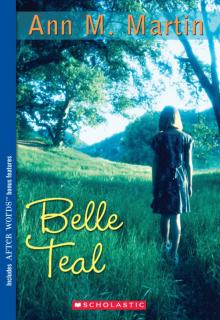 Belle Teale
Belle Teale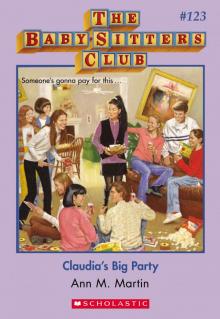 Claudia's Big Party
Claudia's Big Party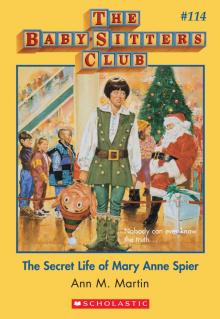 The Secret Life of Mary Anne Spier
The Secret Life of Mary Anne Spier Karen's Book
Karen's Book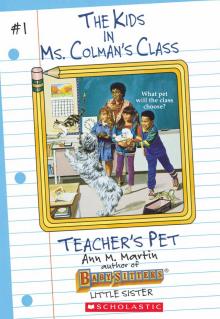 Teacher's Pet
Teacher's Pet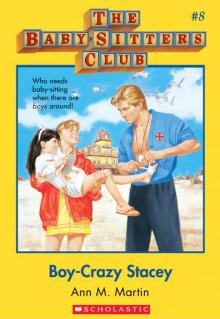 Boy-Crazy Stacey
Boy-Crazy Stacey Claudia and the Disaster Date
Claudia and the Disaster Date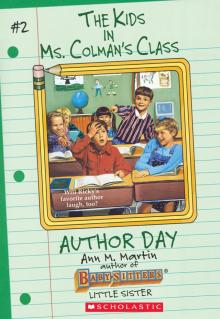 Author Day
Author Day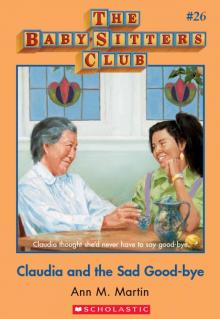 Claudia and the Sad Good-Bye
Claudia and the Sad Good-Bye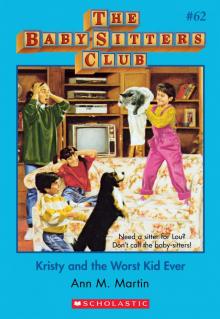 Kristy and the Worst Kid Ever
Kristy and the Worst Kid Ever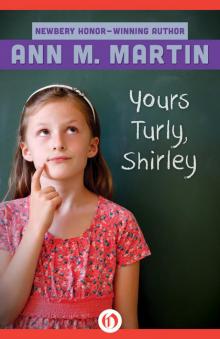 Yours Turly, Shirley
Yours Turly, Shirley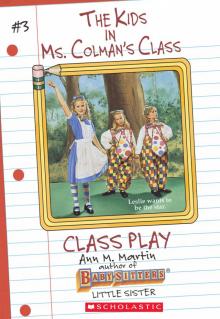 Class Play
Class Play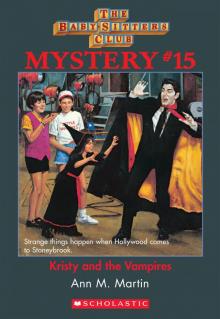 Kristy and the Vampires
Kristy and the Vampires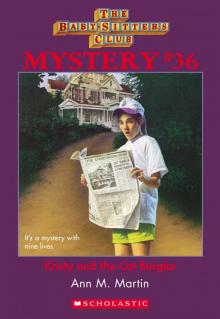 Kristy and the Cat Burglar
Kristy and the Cat Burglar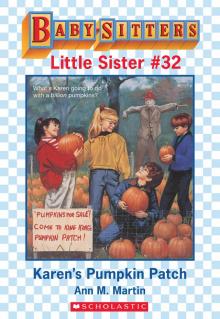 Karen's Pumpkin Patch
Karen's Pumpkin Patch Stacey and the Mystery at the Empty House
Stacey and the Mystery at the Empty House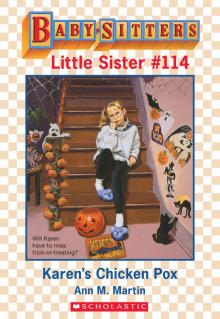 Karen's Chicken Pox
Karen's Chicken Pox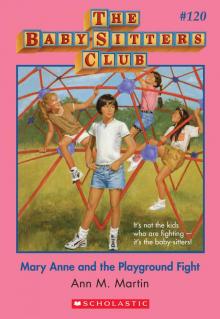 Mary Anne and the Playground Fight
Mary Anne and the Playground Fight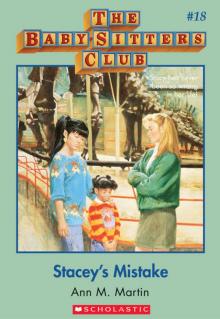 Stacey's Mistake
Stacey's Mistake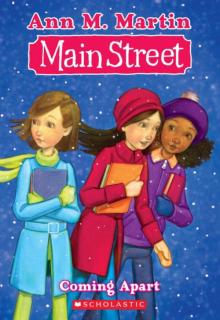 Coming Apart
Coming Apart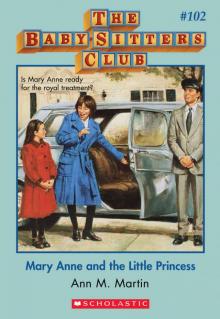 Mary Anne and the Little Princess
Mary Anne and the Little Princess Karen, Hannie and Nancy: The Three Musketeers
Karen, Hannie and Nancy: The Three Musketeers 'Tis the Season
'Tis the Season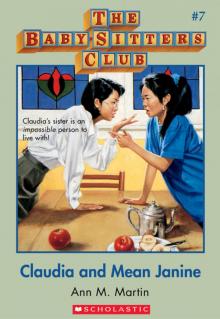 Claudia and Mean Janine
Claudia and Mean Janine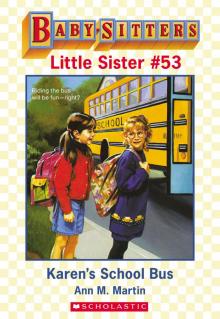 Karen's School Bus
Karen's School Bus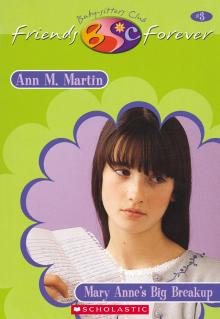 Mary Anne's Big Breakup
Mary Anne's Big Breakup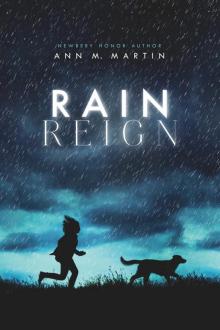 Rain Reign
Rain Reign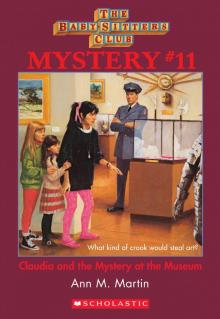 Claudia and the Mystery at the Museum
Claudia and the Mystery at the Museum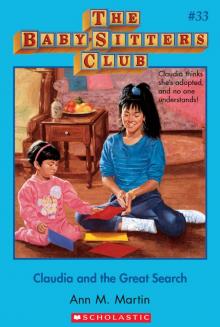 Claudia and the Great Search
Claudia and the Great Search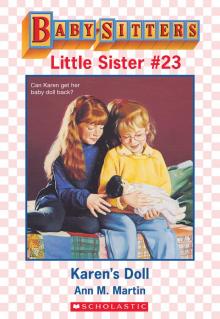 Karen's Doll
Karen's Doll Shannon's Story
Shannon's Story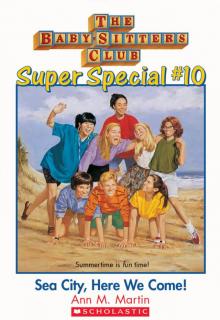 Sea City, Here We Come!
Sea City, Here We Come!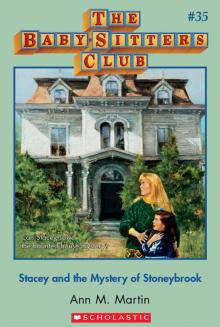 Stacey and the Mystery of Stoneybrook
Stacey and the Mystery of Stoneybrook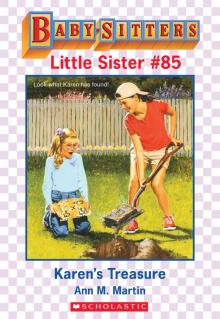 Karen's Treasure
Karen's Treasure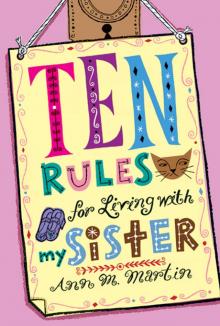 Ten Rules for Living With My Sister
Ten Rules for Living With My Sister With You and Without You
With You and Without You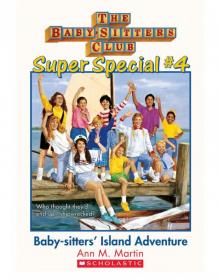 Baby-Sitters' Island Adventure
Baby-Sitters' Island Adventure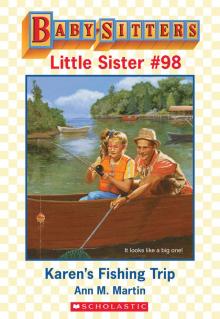 Karen's Fishing Trip
Karen's Fishing Trip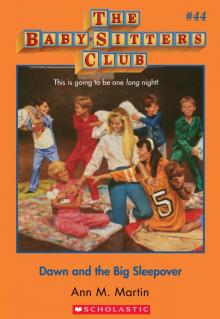 Dawn and the Big Sleepover
Dawn and the Big Sleepover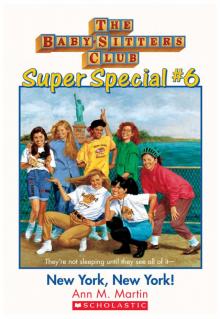 New York, New York!
New York, New York!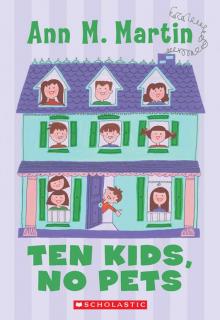 Ten Kids, No Pets
Ten Kids, No Pets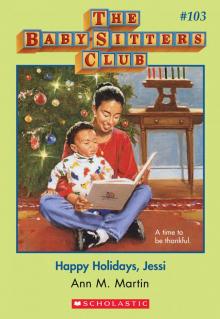 Happy Holidays, Jessi
Happy Holidays, Jessi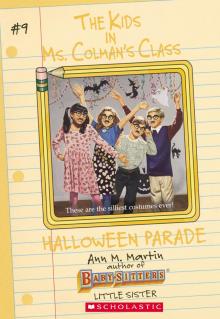 Halloween Parade
Halloween Parade Karen's New Holiday
Karen's New Holiday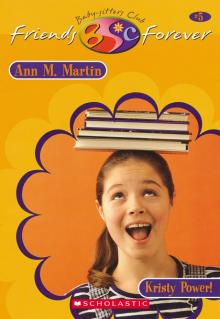 Kristy Power!
Kristy Power!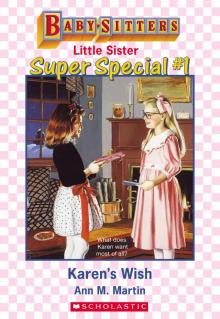 Karen's Wish
Karen's Wish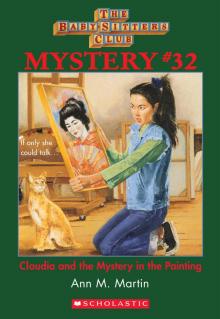 Claudia and the Mystery in the Painting
Claudia and the Mystery in the Painting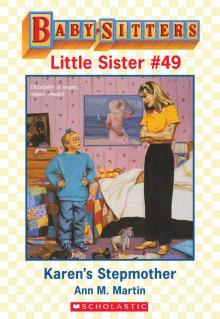 Karen's Stepmother
Karen's Stepmother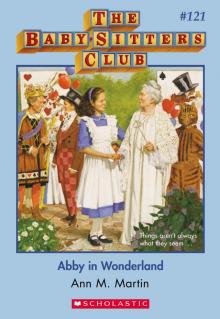 Abby in Wonderland
Abby in Wonderland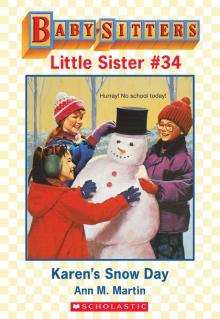 Karen's Snow Day
Karen's Snow Day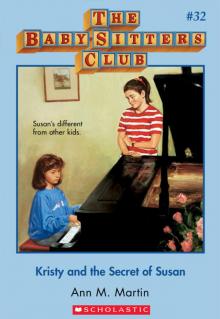 Kristy and the Secret of Susan
Kristy and the Secret of Susan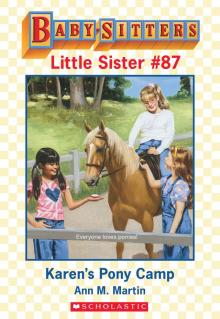 Karen's Pony Camp
Karen's Pony Camp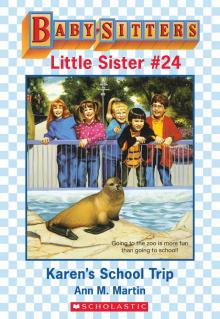 Karen's School Trip
Karen's School Trip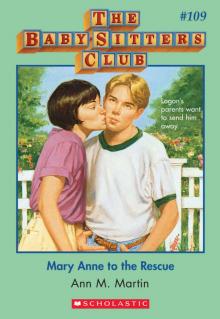 Mary Anne to the Rescue
Mary Anne to the Rescue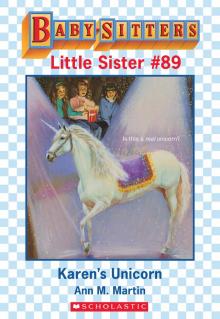 Karen's Unicorn
Karen's Unicorn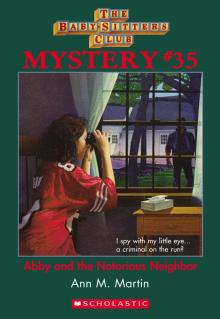 Abby and the Notorious Neighbor
Abby and the Notorious Neighbor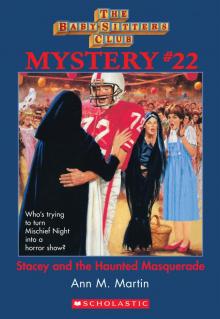 Stacey and the Haunted Masquerade
Stacey and the Haunted Masquerade Claudia Gets Her Guy
Claudia Gets Her Guy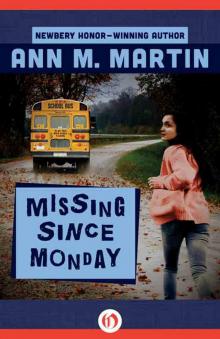 Missing Since Monday
Missing Since Monday Stacey's Choice
Stacey's Choice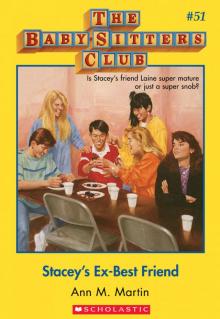 Stacey's Ex-Best Friend
Stacey's Ex-Best Friend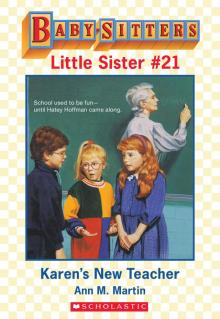 Karen's New Teacher
Karen's New Teacher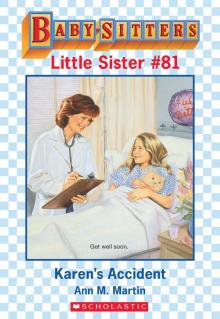 Karen's Accident
Karen's Accident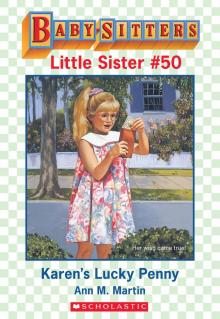 Karen's Lucky Penny
Karen's Lucky Penny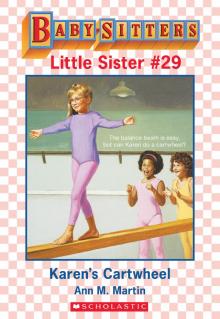 Karen's Cartwheel
Karen's Cartwheel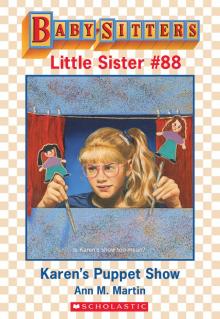 Karen's Puppet Show
Karen's Puppet Show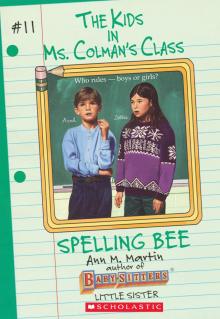 Spelling Bee
Spelling Bee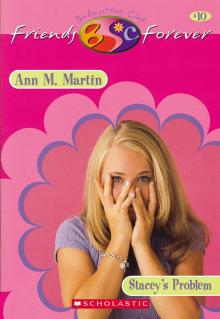 Stacey's Problem
Stacey's Problem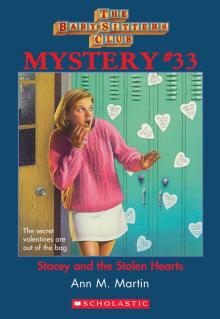 Stacey and the Stolen Hearts
Stacey and the Stolen Hearts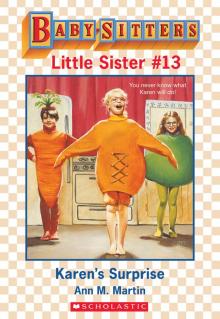 Karen's Surprise
Karen's Surprise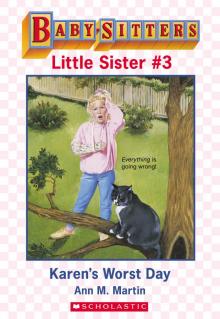 Karen's Worst Day
Karen's Worst Day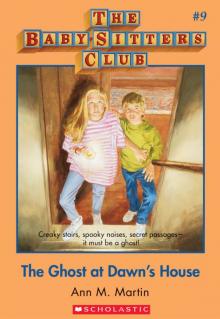 The Ghost at Dawn's House
The Ghost at Dawn's House Karen's Big Sister
Karen's Big Sister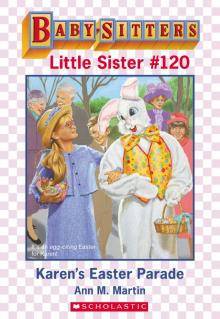 Karen's Easter Parade
Karen's Easter Parade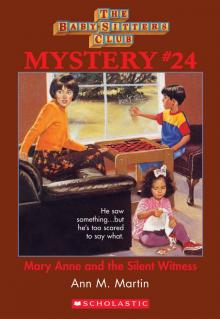 Mary Anne and the Silent Witness
Mary Anne and the Silent Witness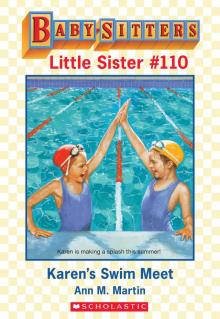 Karen's Swim Meet
Karen's Swim Meet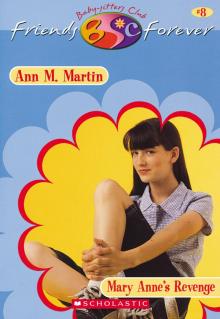 Mary Anne's Revenge
Mary Anne's Revenge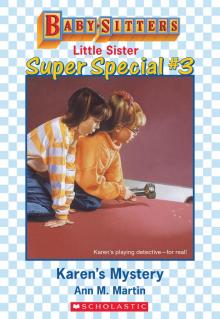 Karen's Mystery
Karen's Mystery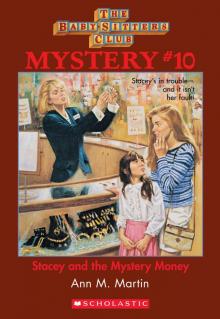 Stacey and the Mystery Money
Stacey and the Mystery Money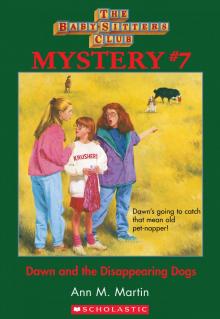 Dawn and the Disappearing Dogs
Dawn and the Disappearing Dogs Karen's Christmas Tree
Karen's Christmas Tree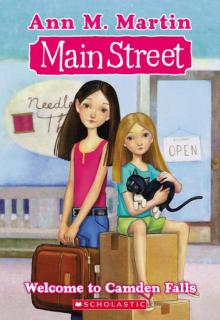 Welcome to Camden Falls
Welcome to Camden Falls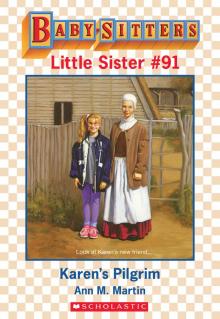 Karen's Pilgrim
Karen's Pilgrim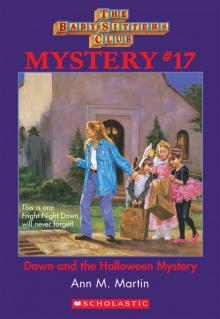 Dawn and the Halloween Mystery
Dawn and the Halloween Mystery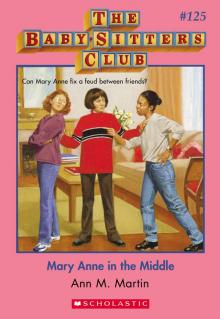 Mary Anne in the Middle
Mary Anne in the Middle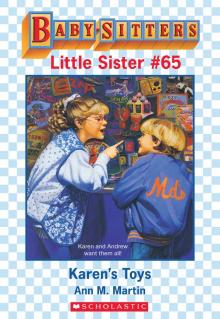 Karen's Toys
Karen's Toys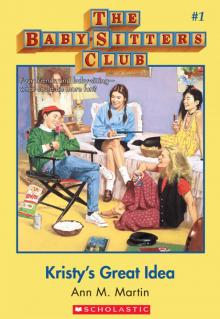 Kristy's Great Idea
Kristy's Great Idea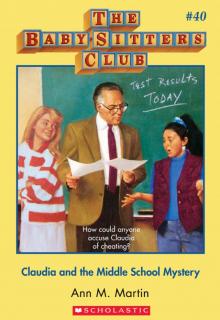 Claudia and the Middle School Mystery
Claudia and the Middle School Mystery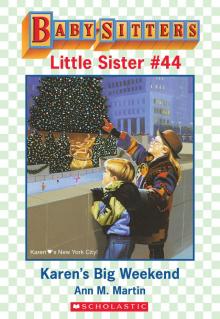 Karen's Big Weekend
Karen's Big Weekend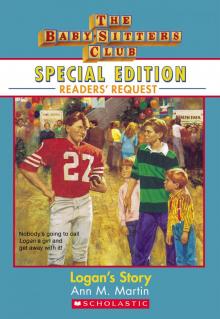 Logan's Story
Logan's Story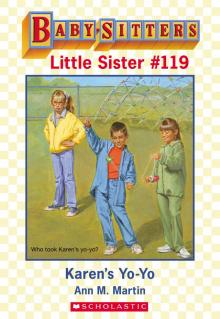 Karen's Yo-Yo
Karen's Yo-Yo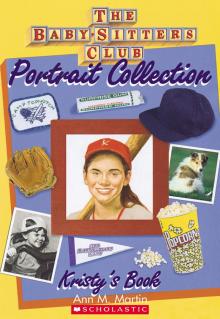 Kristy's Book
Kristy's Book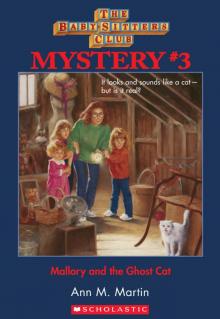 Mallory and the Ghost Cat
Mallory and the Ghost Cat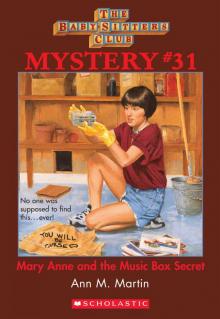 Mary Anne and the Music
Mary Anne and the Music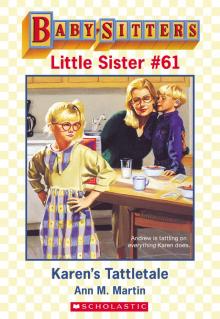 Karen's Tattletale
Karen's Tattletale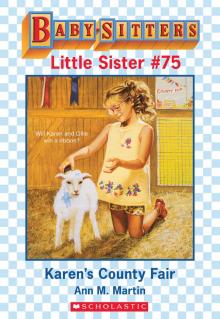 Karen's County Fair
Karen's County Fair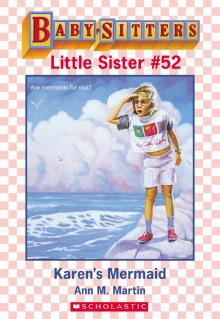 Karen's Mermaid
Karen's Mermaid Snowbound
Snowbound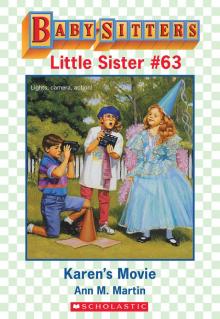 Karen's Movie
Karen's Movie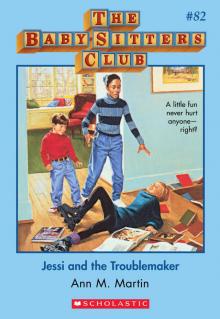 Jessi and the Troublemaker
Jessi and the Troublemaker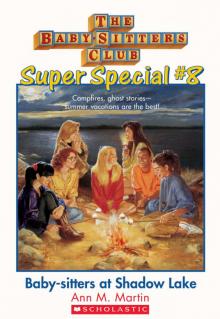 Baby-Sitters at Shadow Lake
Baby-Sitters at Shadow Lake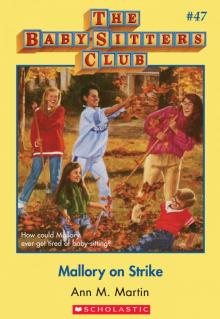 Mallory on Strike
Mallory on Strike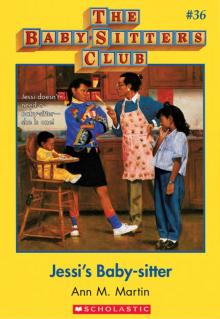 Jessi's Baby-Sitter
Jessi's Baby-Sitter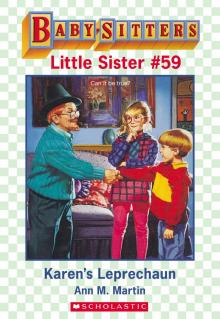 Karen's Leprechaun
Karen's Leprechaun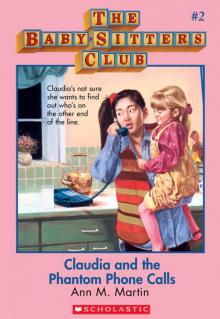 Claudia and the Phantom Phone Calls
Claudia and the Phantom Phone Calls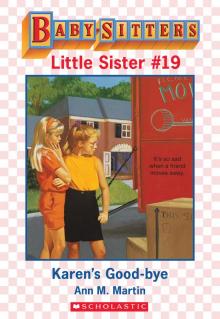 Karen's Good-Bye
Karen's Good-Bye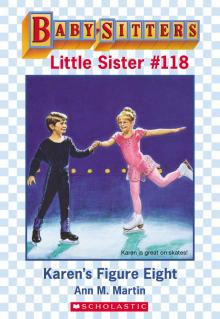 Karen's Figure Eight
Karen's Figure Eight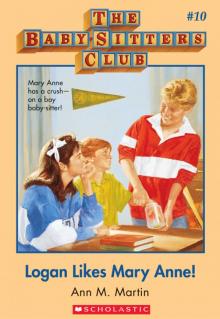 Logan Likes Mary Anne!
Logan Likes Mary Anne!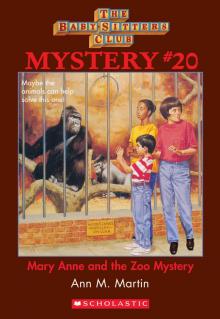 Mary Anne and the Zoo Mystery
Mary Anne and the Zoo Mystery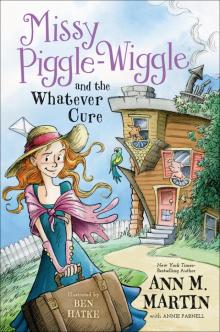 Missy Piggle-Wiggle and the Whatever Cure
Missy Piggle-Wiggle and the Whatever Cure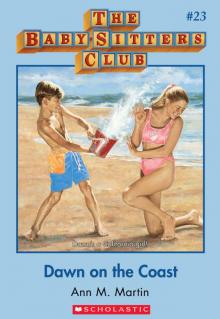 Dawn on the Coast
Dawn on the Coast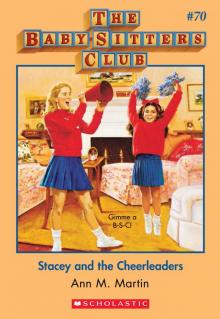 Stacey and the Cheerleaders
Stacey and the Cheerleaders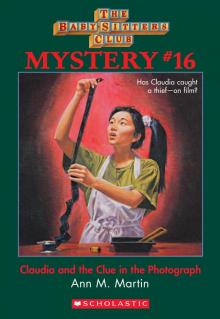 Claudia and the Clue in the Photograph
Claudia and the Clue in the Photograph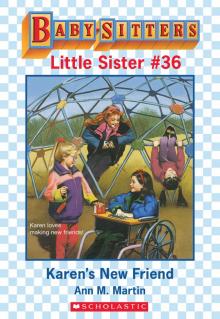 Karen's New Friend
Karen's New Friend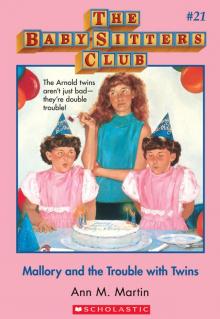 Mallory and the Trouble With Twins
Mallory and the Trouble With Twins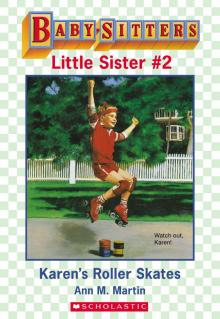 Karen's Roller Skates
Karen's Roller Skates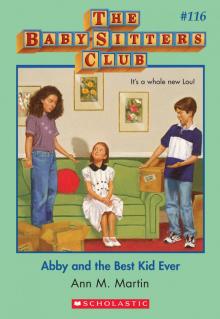 Abby and the Best Kid Ever
Abby and the Best Kid Ever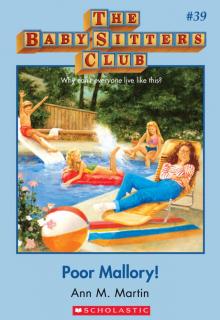 Poor Mallory!
Poor Mallory!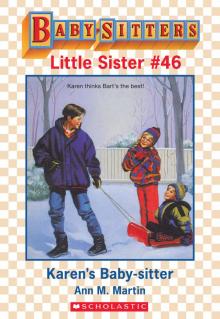 Karen's Witch
Karen's Witch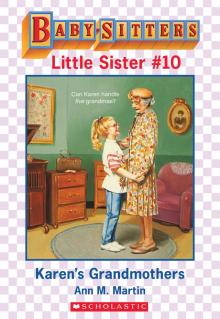 Karen's Grandmothers
Karen's Grandmothers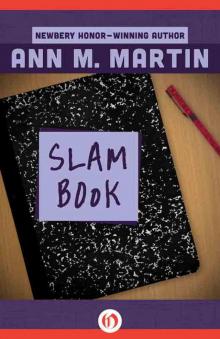 Slam Book
Slam Book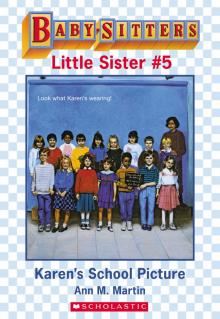 Karen's School Picture
Karen's School Picture Karen's Reindeer
Karen's Reindeer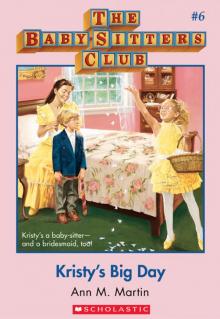 Kristy's Big Day
Kristy's Big Day The Long Way Home
The Long Way Home Karen's Sleigh Ride
Karen's Sleigh Ride On Christmas Eve
On Christmas Eve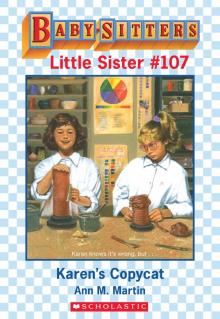 Karen's Copycat
Karen's Copycat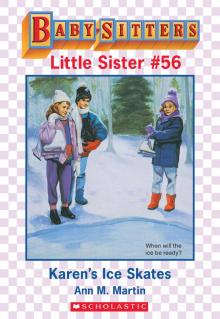 Karen's Ice Skates
Karen's Ice Skates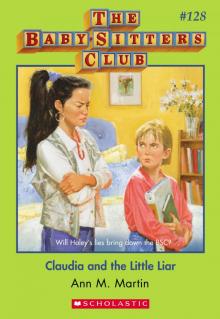 Claudia and the Little Liar
Claudia and the Little Liar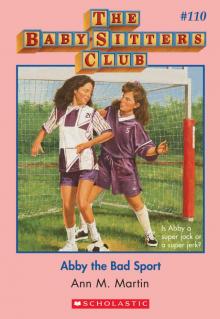 Abby the Bad Sport
Abby the Bad Sport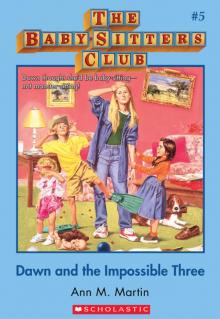 The Baby-Sitters Club #5: Dawn and the Impossible Three
The Baby-Sitters Club #5: Dawn and the Impossible Three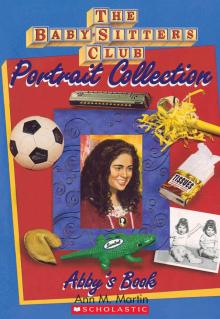 Abby's Book
Abby's Book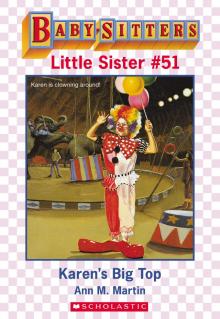 Karen's Big Top
Karen's Big Top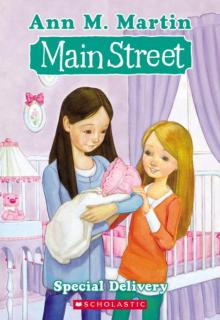 Main Street #8: Special Delivery
Main Street #8: Special Delivery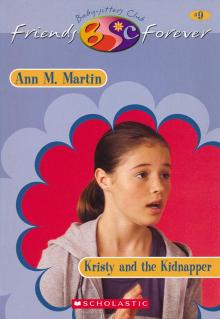 Kristy and the Kidnapper
Kristy and the Kidnapper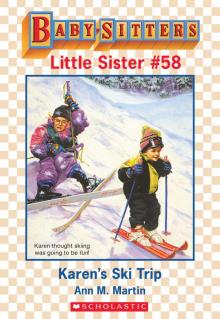 Karen's Ski Trip
Karen's Ski Trip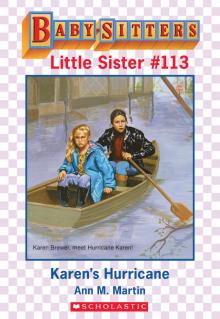 Karen's Hurricane
Karen's Hurricane Stacey and the Mystery at the Mall
Stacey and the Mystery at the Mall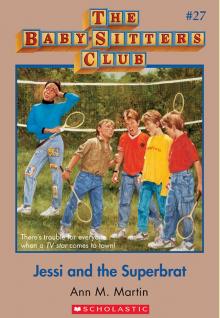 Jessi and the Superbrat
Jessi and the Superbrat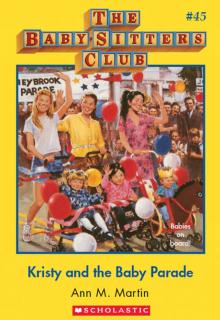 Kristy and the Baby Parade
Kristy and the Baby Parade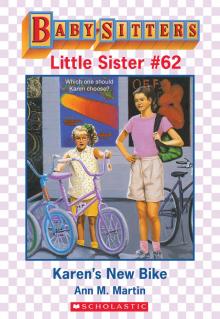 Karen's New Bike
Karen's New Bike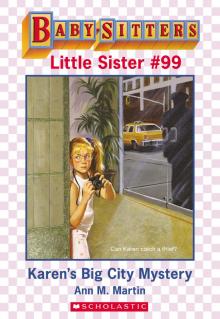 Karen's Big City Mystery
Karen's Big City Mystery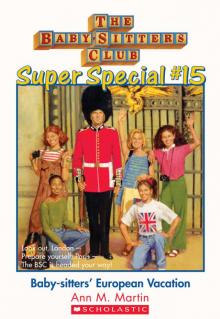 Baby-Sitters' European Vacation
Baby-Sitters' European Vacation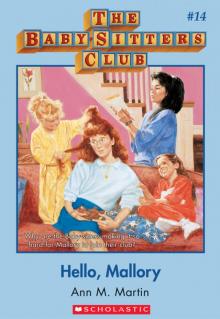 Hello, Mallory
Hello, Mallory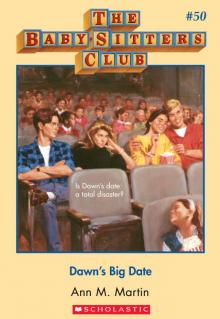 Dawn's Big Date
Dawn's Big Date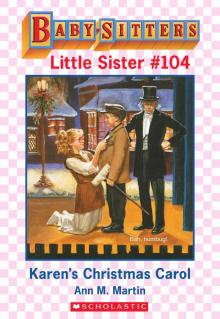 Karen's Christmas Carol
Karen's Christmas Carol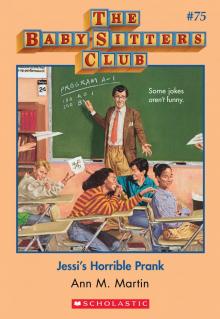 Jessi's Horrible Prank
Jessi's Horrible Prank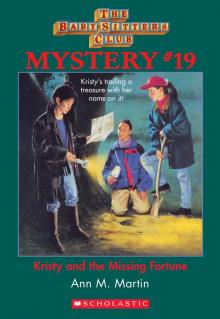 Kristy and the Missing Fortune
Kristy and the Missing Fortune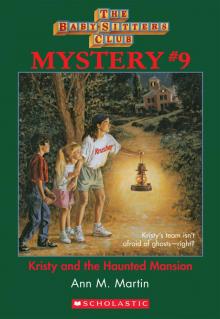 Kristy and the Haunted Mansion
Kristy and the Haunted Mansion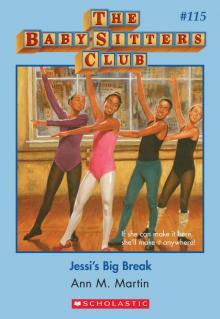 Jessi's Big Break
Jessi's Big Break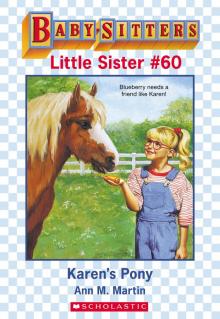 Karen's Pony
Karen's Pony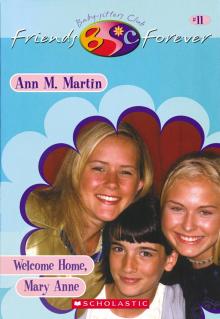 Welcome Home, Mary Anne
Welcome Home, Mary Anne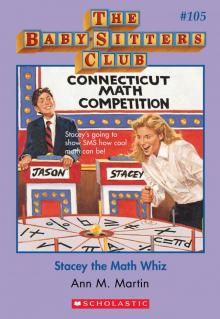 Stacey the Math Whiz
Stacey the Math Whiz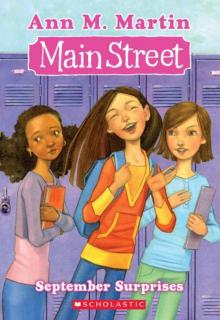 September Surprises
September Surprises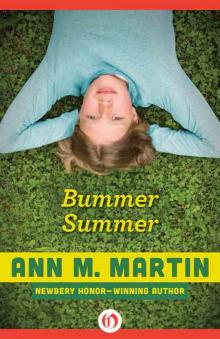 Bummer Summer
Bummer Summer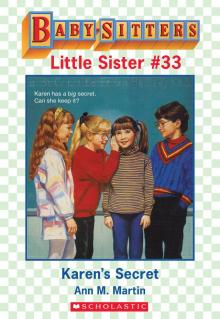 Karen's Secret
Karen's Secret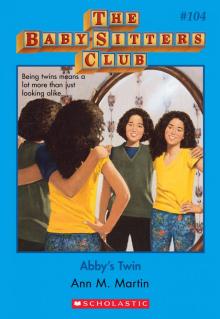 Abby's Twin
Abby's Twin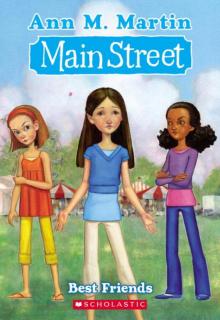 Main Street #4: Best Friends
Main Street #4: Best Friends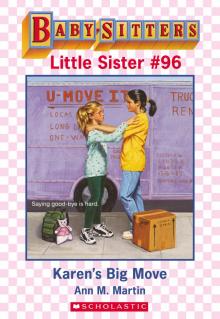 Karen's Big Move
Karen's Big Move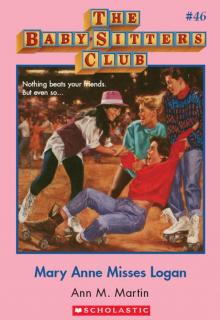 Mary Anne Misses Logan
Mary Anne Misses Logan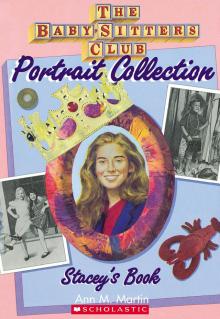 Stacey's Book
Stacey's Book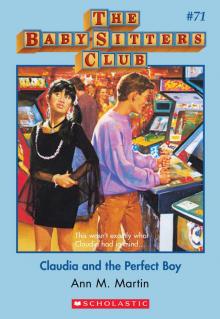 Claudia and the Perfect Boy
Claudia and the Perfect Boy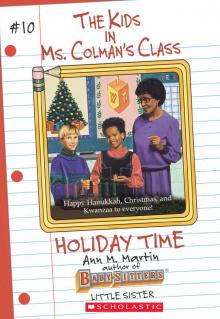 Holiday Time
Holiday Time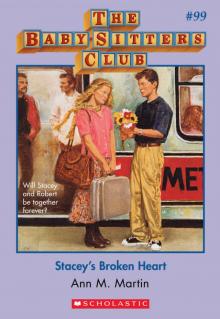 Stacey's Broken Heart
Stacey's Broken Heart Karen's Field Day
Karen's Field Day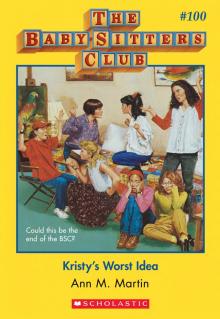 Kristy's Worst Idea
Kristy's Worst Idea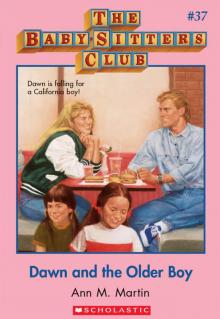 Dawn and the Older Boy
Dawn and the Older Boy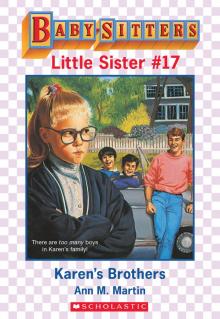 Karen's Brothers
Karen's Brothers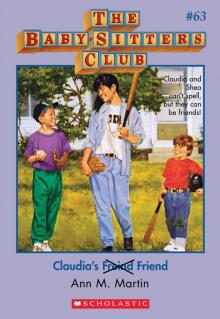 Claudia's Friend
Claudia's Friend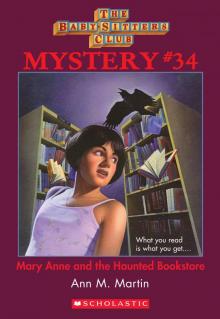 Mary Anne and the Haunted Bookstore
Mary Anne and the Haunted Bookstore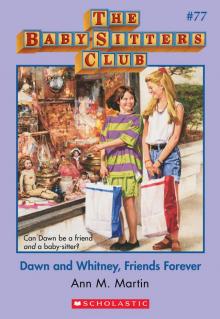 Dawn and Whitney, Friends Forever
Dawn and Whitney, Friends Forever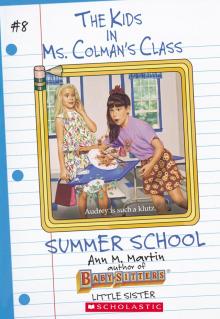 Summer School
Summer School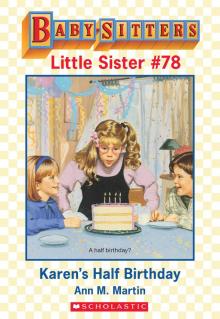 Karen's Birthday
Karen's Birthday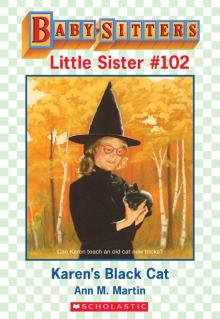 Karen's Black Cat
Karen's Black Cat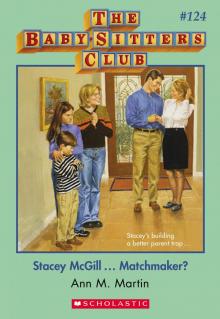 Stacey McGill... Matchmaker?
Stacey McGill... Matchmaker?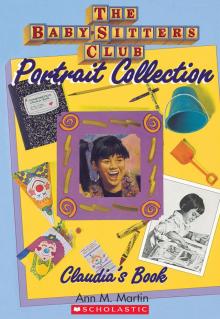 Claudia's Book
Claudia's Book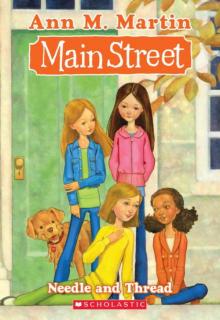 Main Street #2: Needle and Thread
Main Street #2: Needle and Thread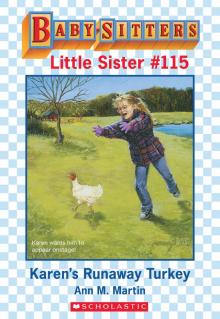 Karen's Runaway Turkey
Karen's Runaway Turkey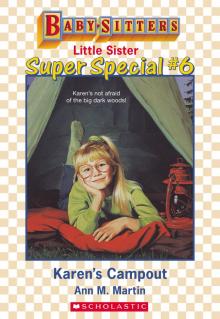 Karen's Campout
Karen's Campout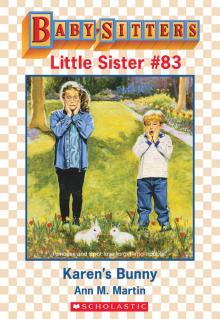 Karen's Bunny
Karen's Bunny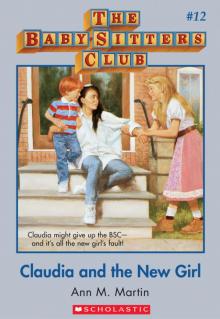 Claudia and the New Girl
Claudia and the New Girl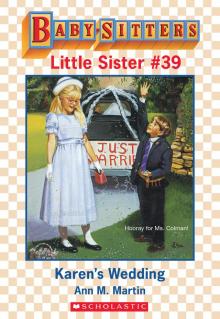 Karen's Wedding
Karen's Wedding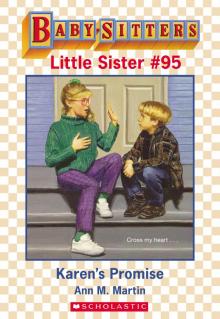 Karen's Promise
Karen's Promise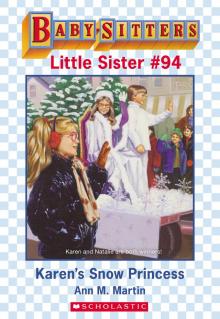 Karen's Snow Princess
Karen's Snow Princess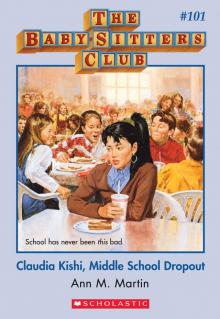 Claudia Kishi, Middle School Dropout
Claudia Kishi, Middle School Dropout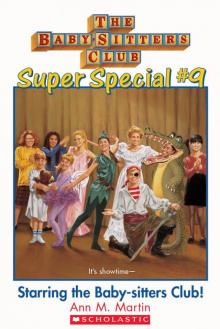 Starring the Baby-Sitters Club!
Starring the Baby-Sitters Club!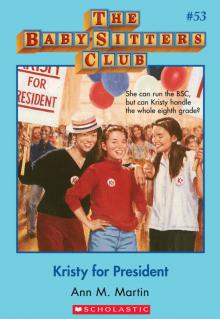 Kristy for President
Kristy for President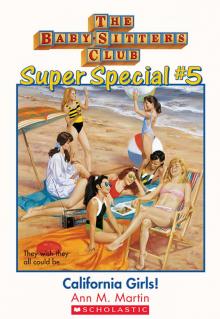 California Girls!
California Girls!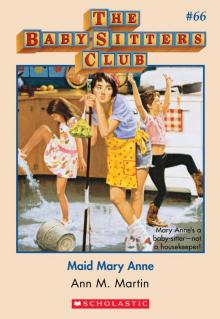 Maid Mary Anne
Maid Mary Anne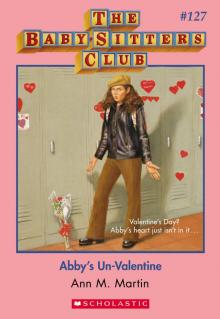 Abby's Un-Valentine
Abby's Un-Valentine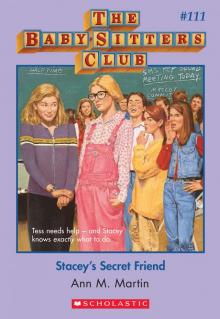 Stacey's Secret Friend
Stacey's Secret Friend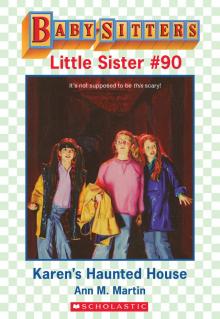 Karen's Haunted House
Karen's Haunted House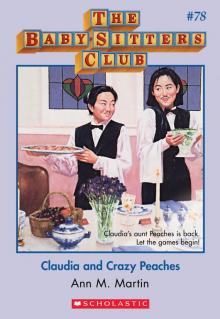 Claudia and Crazy Peaches
Claudia and Crazy Peaches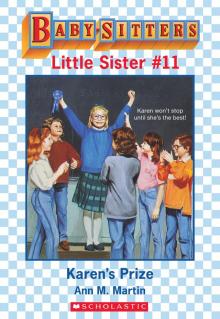 Karen's Prize
Karen's Prize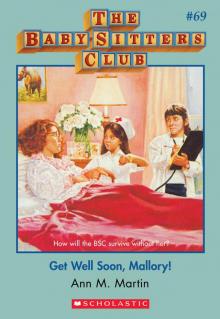 Get Well Soon, Mallory!
Get Well Soon, Mallory!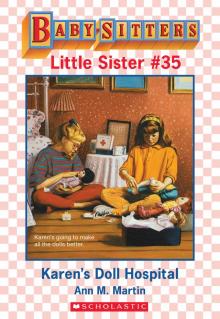 Karen's Doll Hospital
Karen's Doll Hospital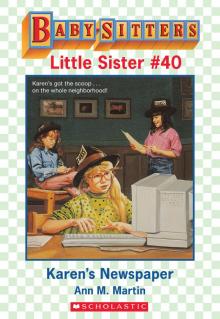 Karen's Newspaper
Karen's Newspaper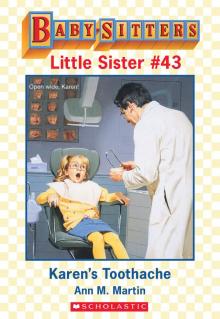 Karen's Toothache
Karen's Toothache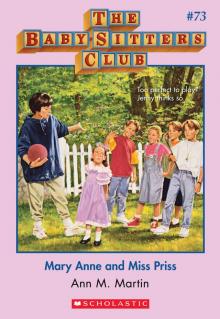 Mary Anne and Miss Priss
Mary Anne and Miss Priss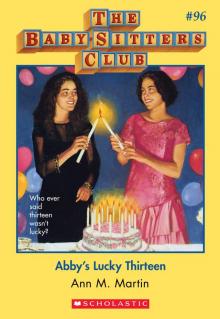 Abby's Lucky Thirteen
Abby's Lucky Thirteen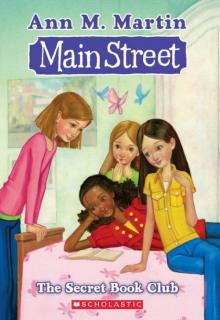 The Secret Book Club
The Secret Book Club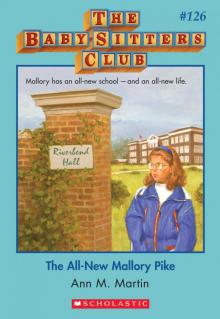 The All-New Mallory Pike
The All-New Mallory Pike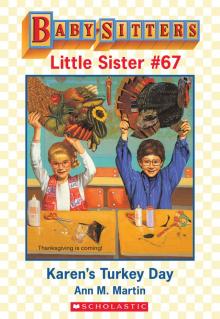 Karen's Turkey Day
Karen's Turkey Day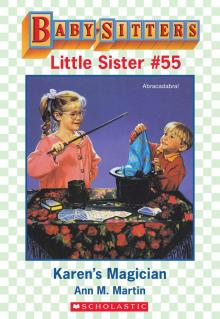 Karen's Magician
Karen's Magician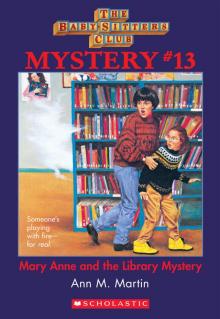 Mary Anne and the Library Mystery
Mary Anne and the Library Mystery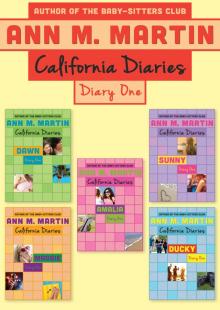 Diary One: Dawn, Sunny, Maggie, Amalia, and Ducky
Diary One: Dawn, Sunny, Maggie, Amalia, and Ducky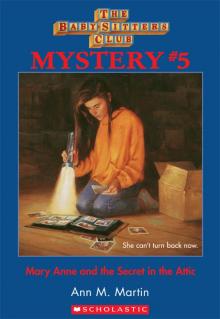 Mary Anne and the Secret in the Attic
Mary Anne and the Secret in the Attic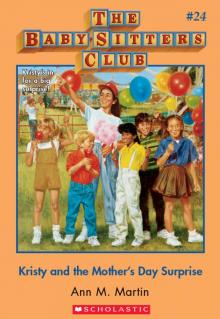 Kristy and the Mother's Day Surprise
Kristy and the Mother's Day Surprise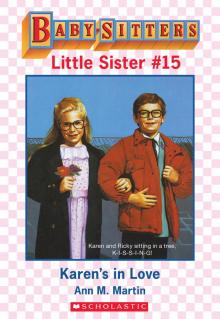 Karen's in Love
Karen's in Love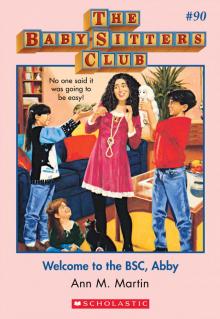 Welcome to the BSC, Abby
Welcome to the BSC, Abby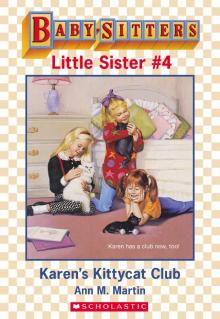 Karen's Kittycat Club
Karen's Kittycat Club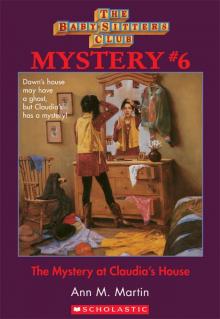 The Mystery at Claudia's House
The Mystery at Claudia's House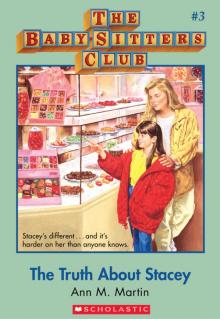 The Truth About Stacey
The Truth About Stacey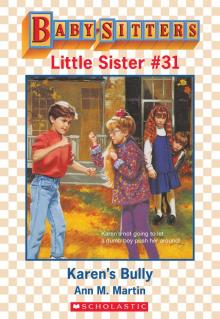 Karen's Bully
Karen's Bully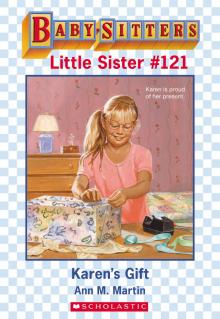 Karen's Gift
Karen's Gift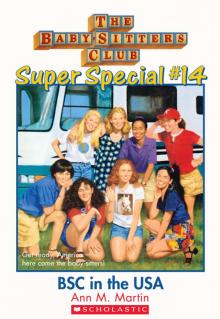 BSC in the USA
BSC in the USA Everything for a Dog
Everything for a Dog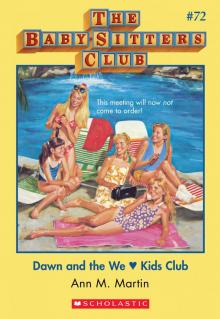 Dawn and the We Love Kids Club
Dawn and the We Love Kids Club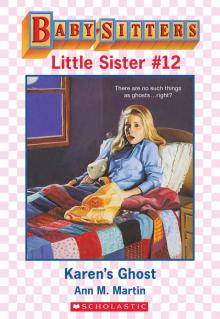 Karen's Ghost
Karen's Ghost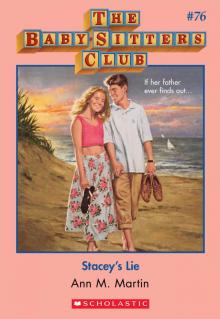 Stacey's Lie
Stacey's Lie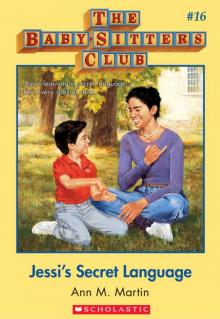 Jessi's Secret Language
Jessi's Secret Language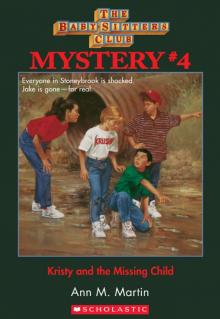 Kristy and the Missing Child
Kristy and the Missing Child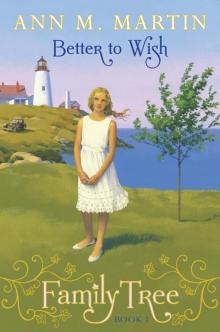 Better to Wish
Better to Wish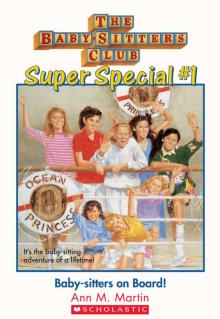 Baby-Sitters on Board!
Baby-Sitters on Board!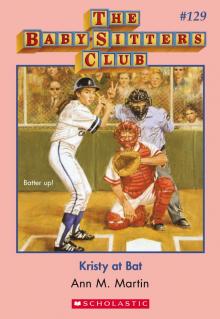 Kristy at Bat
Kristy at Bat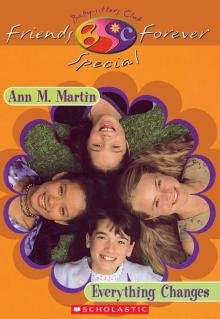 Everything Changes
Everything Changes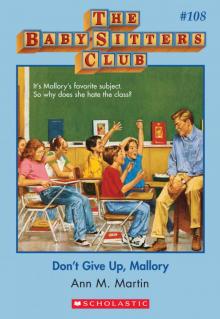 Don't Give Up, Mallory
Don't Give Up, Mallory A Dog's Life: The Autobiography of a Stray
A Dog's Life: The Autobiography of a Stray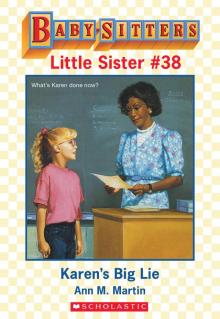 Karen's Big Lie
Karen's Big Lie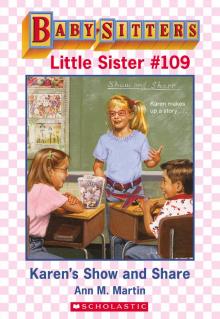 Karen's Show and Share
Karen's Show and Share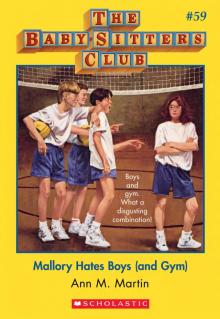 Mallory Hates Boys (and Gym)
Mallory Hates Boys (and Gym)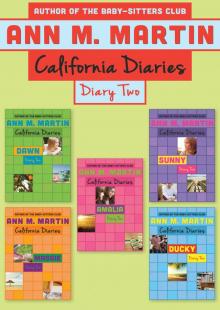 Diary Two: Dawn, Sunny, Maggie, Amalia, and Ducky
Diary Two: Dawn, Sunny, Maggie, Amalia, and Ducky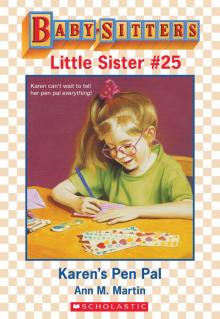 Karen's Pen Pal
Karen's Pen Pal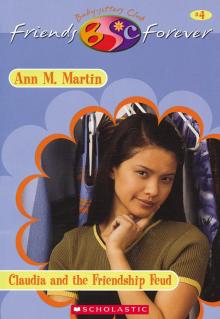 Claudia and the Friendship Feud
Claudia and the Friendship Feud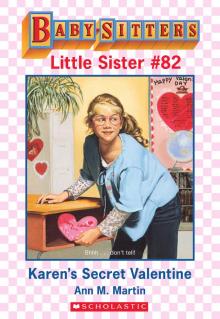 Karen's Secret Valentine
Karen's Secret Valentine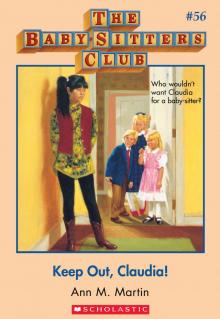 Keep Out, Claudia!
Keep Out, Claudia!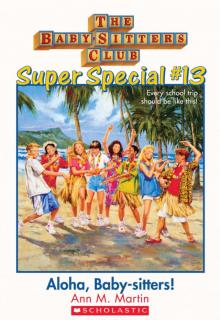 Aloha, Baby-Sitters!
Aloha, Baby-Sitters!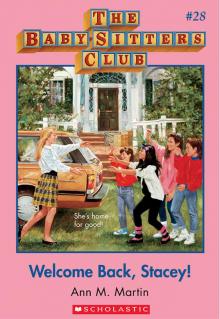 Welcome Back, Stacey
Welcome Back, Stacey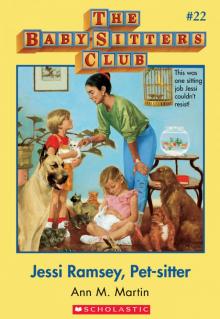 Jessi Ramsey, Pet-Sitter
Jessi Ramsey, Pet-Sitter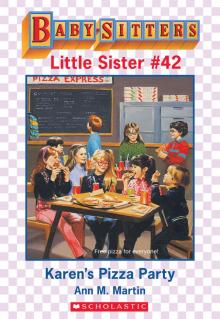 Karen's Pizza Party
Karen's Pizza Party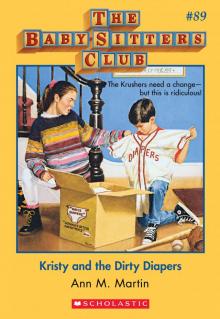 Kristy and the Dirty Diapers
Kristy and the Dirty Diapers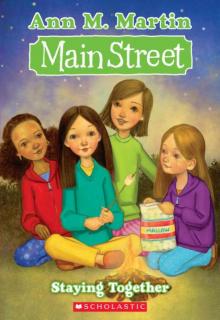 Staying Together
Staying Together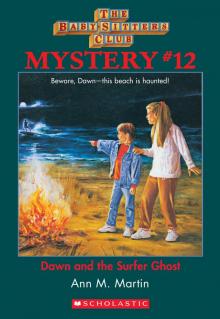 Dawn and the Surfer Ghost
Dawn and the Surfer Ghost Claudia Makes Up Her Mind
Claudia Makes Up Her Mind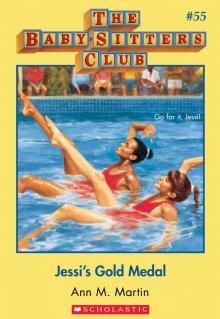 Jessi's Gold Medal
Jessi's Gold Medal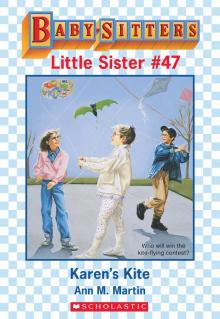 Karen's Kite
Karen's Kite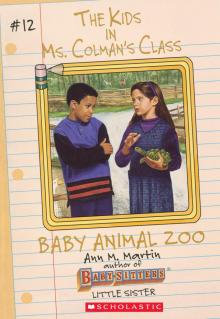 Baby Animal Zoo
Baby Animal Zoo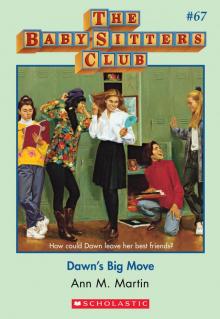 Dawn's Big Move
Dawn's Big Move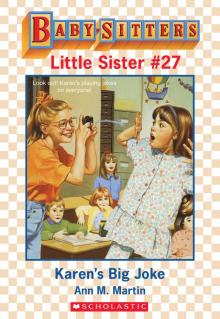 Karen's Big Joke
Karen's Big Joke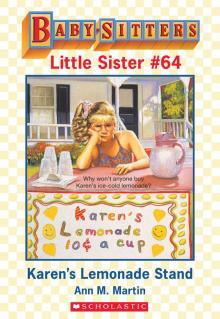 Karen's Lemonade Stand
Karen's Lemonade Stand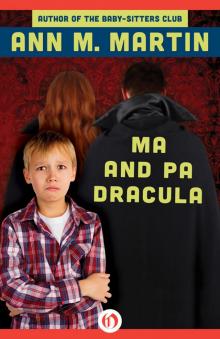 Ma and Pa Dracula
Ma and Pa Dracula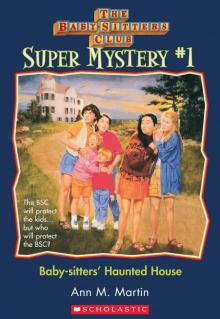 Baby-Sitters' Haunted House
Baby-Sitters' Haunted House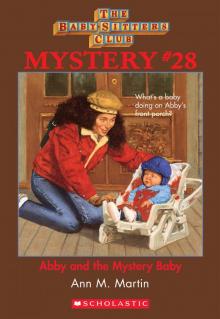 Abby and the Mystery Baby
Abby and the Mystery Baby Home Is the Place
Home Is the Place Karen's Grandad
Karen's Grandad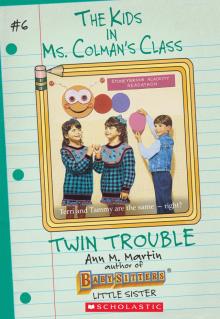 Twin Trouble
Twin Trouble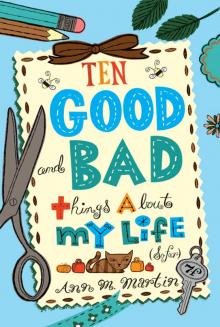 Ten Good and Bad Things About My Life (So Far)
Ten Good and Bad Things About My Life (So Far)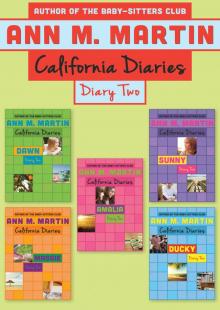 Diary Two
Diary Two Baby-Sitters Club 027
Baby-Sitters Club 027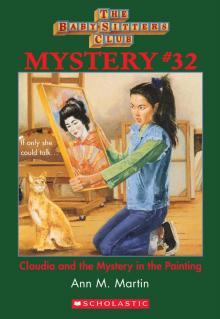 Claudia and the Mystery Painting
Claudia and the Mystery Painting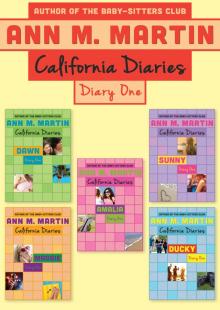 Diary One
Diary One Baby-Sitters Club 037
Baby-Sitters Club 037 Baby-Sitters Club 028
Baby-Sitters Club 028 Baby-Sitters Club 085
Baby-Sitters Club 085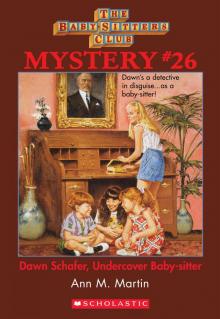 Dawn Schaffer Undercover Baby-Sitter
Dawn Schaffer Undercover Baby-Sitter Jessi's Babysitter
Jessi's Babysitter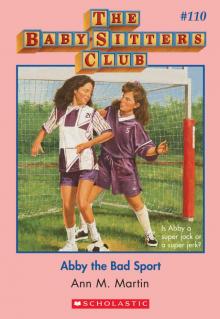 The Baby-Sitters Club #110: Abby the Bad Sport (Baby-Sitters Club, The)
The Baby-Sitters Club #110: Abby the Bad Sport (Baby-Sitters Club, The) Karen's Little Sister
Karen's Little Sister Baby-Sitters Club 058
Baby-Sitters Club 058 Claudia And The Genius On Elm St.
Claudia And The Genius On Elm St. Missy Piggle-Wiggle and the Sticky-Fingers Cure
Missy Piggle-Wiggle and the Sticky-Fingers Cure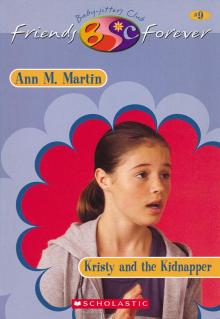 Kristy and Kidnapper
Kristy and Kidnapper Baby-Sitters Club 041
Baby-Sitters Club 041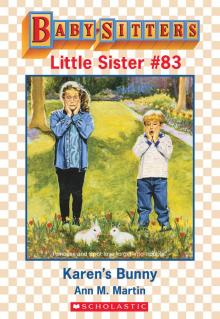 Karen's Bunny Trouble
Karen's Bunny Trouble Baby-Sitters Club 032
Baby-Sitters Club 032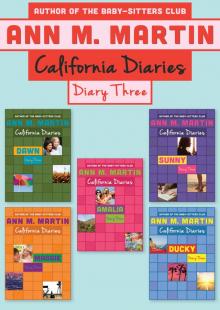 Diary Three
Diary Three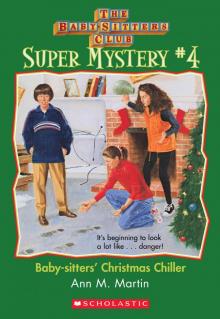 Christmas Chiller
Christmas Chiller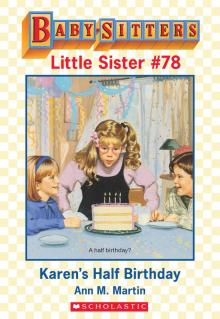 Karen's Half-Birthday
Karen's Half-Birthday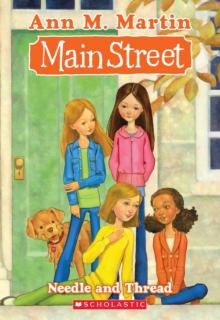 Needle and Thread
Needle and Thread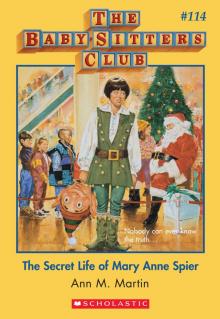 Secret Life of Mary Anne Spier
Secret Life of Mary Anne Spier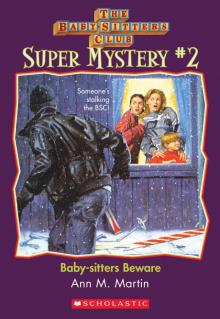 Baby-Sitters Beware
Baby-Sitters Beware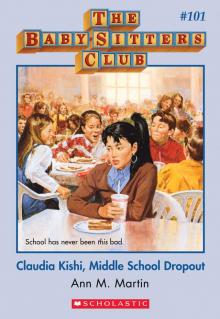 Claudia Kishi, Middle School Drop-Out
Claudia Kishi, Middle School Drop-Out Logan Likes Mary Anne !
Logan Likes Mary Anne ! Baby-Sitters Club 061
Baby-Sitters Club 061 Best Friends
Best Friends Baby-Sitters Club 031
Baby-Sitters Club 031 Karen's Little Witch
Karen's Little Witch Jessi Ramsey, Petsitter
Jessi Ramsey, Petsitter Baby-Sitters Club 123
Baby-Sitters Club 123 Baby-Sitters Club 059
Baby-Sitters Club 059 Baby-Sitters Club 033
Baby-Sitters Club 033 Baby-Sitters Club 060
Baby-Sitters Club 060 Baby-Sitters Club 094
Baby-Sitters Club 094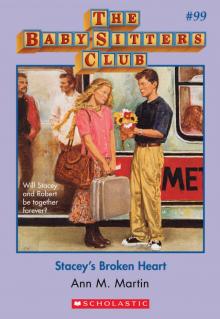 The Baby-Sitters Club #99: Stacey's Broken Heart
The Baby-Sitters Club #99: Stacey's Broken Heart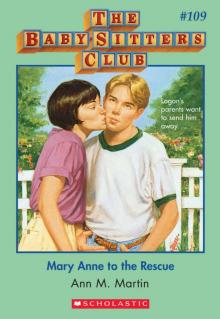 The Baby-Sitters Club #109: Mary Anne to the Rescue (Baby-Sitters Club, The)
The Baby-Sitters Club #109: Mary Anne to the Rescue (Baby-Sitters Club, The) Mystery At Claudia's House
Mystery At Claudia's House Claudia And The Sad Goodbye
Claudia And The Sad Goodbye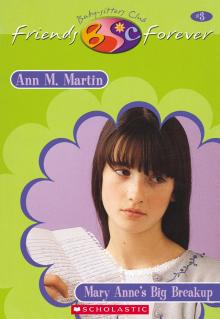 Mary Anne's Big Break-Up
Mary Anne's Big Break-Up Baby-Sitters Club 025
Baby-Sitters Club 025 Baby-Sitters Club 042
Baby-Sitters Club 042 Stacey and the Mystery of the Empty House
Stacey and the Mystery of the Empty House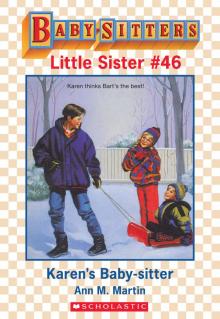 Karen's Baby-Sitter
Karen's Baby-Sitter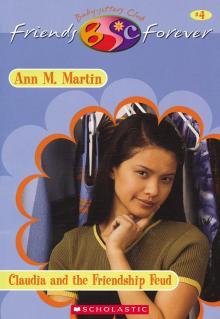 Claudia's Friendship Feud
Claudia's Friendship Feud Baby-Sitters Club 090
Baby-Sitters Club 090 Baby-Sitters Club 021
Baby-Sitters Club 021 Baby-Sitters Club 056
Baby-Sitters Club 056 Baby-Sitters Club 040
Baby-Sitters Club 040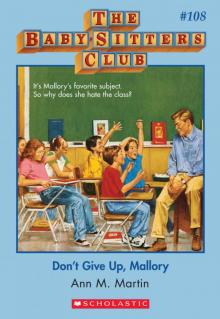 The Baby-Sitters Club #108: Don't Give Up, Mallory (Baby-Sitters Club, The)
The Baby-Sitters Club #108: Don't Give Up, Mallory (Baby-Sitters Club, The)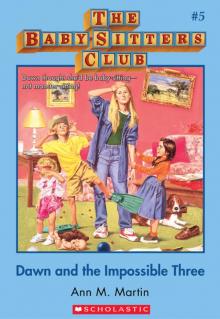 Dawn and the Impossible Three
Dawn and the Impossible Three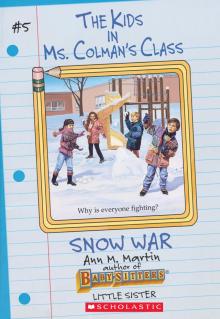 The Snow War
The Snow War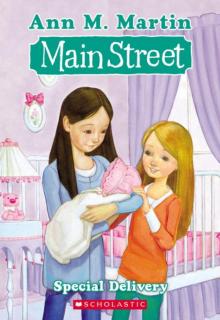 Special Delivery
Special Delivery Baby-Sitters Club 057
Baby-Sitters Club 057 Mary Anne And Too Many Babies
Mary Anne And Too Many Babies Baby-Sitters Club 030
Baby-Sitters Club 030